2022-23 Course of Study
Landon School, a private day school for boys located in Bethesda, Maryland, offers a challenging college preparatory program for Grades 3–12.
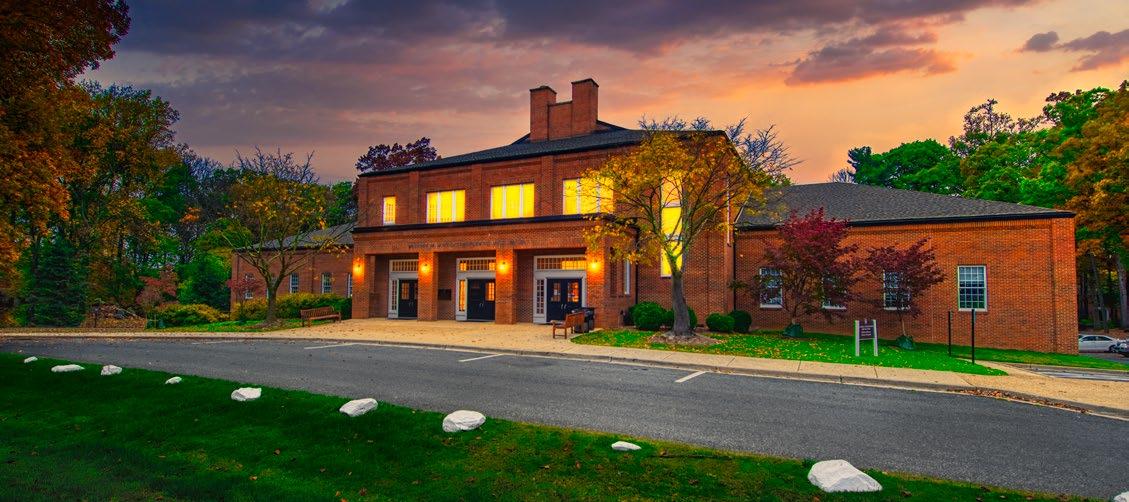
Landon School is committed to the ethical, intellectual, and personal development of boys. We challenge and inspire them to think deeply, individually, and broadly; to live with respect and honor; and to grow into healthy, well-rounded men of integrity and character who seek to make a positive difference in the world around them.
TABLE OF CONTENTS
Portrait
Educational
Community
Athletics
Performing
Studio
Landon-Holton Coordinate
Graduation
Ethics,
Honors
General
Important About Schedule Changes
of A Graduate .................................................................................. 1 Educational Values ......................................................................................... 2
Technology and Libraries ........................................................ 3
Service ....................................................................................... 5
.......................................................................................................... 6 English ............................................................................................................. 7 History ........................................................................................................... 11 Mathematics 17
Arts 21 Science 25
Arts 31 World Languages 34 Independent Study 41
Program 42
Requirements 43
Service, and Leadership Program 44
and Advanced Courses 45
Notes 45
Notes
............................................... 46
PORTRAIT OF A GRADUATE
Landon students are offered a unique experience. Our goal is that they will do something with it, that they will make a positive difference in their communities and the larger world, in ways big and small. Our goal is that they will become virtuous and well-rounded men who contribute and give back to the common good out of both a sense of personal responsibility and an awareness that much has been given to them.
With this in mind, our ambition is that Landon graduates might be described individually and collectively –and throughout their lives – as persons who:
ACT ETHICALLY LIVE RESPONSIBLY
Landon graduates’ identities are formed by the character principles in which they have been immersed over their time at the school. Boys leave Landon with years of practice grounding their actions in ethical principles and exploring what makes an honorable life.
Landon graduates have been held to a high standard of respect over their time at the school. They have been taught what it means to treat others with the dignity they deserve as fellow human beings, especially across categories of identity and difference, and with the foundational skills of empathy and civility that ready them to serve and contribute to the communities they encounter beyond Landon.
Landon graduates have been taught the meaning of responsibility and how to engage with their communities, knowing both how to build up and how to draw on the capacities of those communities in productive ways. Boys leave Landon having experienced over their time here increasing degrees of independence and initiative as well as accountability for their own learning and behaviors.
SERVE SELFLESSLY COMMUNICATE CLEARLY
Landon graduates have been provided with an educational experience that not only provides them with the foundations to live a full and meaningful life, but also one that teaches them that they are part of something greater than themselves and that they have a responsibility to that larger whole. Boys leave Landon with an ethical framework that tells them that one of the most important ways to lead is to set aside the self and to be of service to others, to the community, and to the greater good.
EMBRACE CHALLENGE RESPECT OTHERS THINK DEEPLY
Landon graduates have experienced a program that intentionally seeks to develop scholarship, creativity, and critical thinking in ways that build their problemsolving capabilities. Boys leave Landon ready to use these skills, and just as importantly, to continue to develop them so that they might face and address in thoughtful, examined, and informed ways the new and evolving challenges life will bring to them.
Landon graduates experienced a school that asks a lot of them – that is at once demanding and supportive and that expects them to learn from mistakes, to try new and challenging things, and to stretch themselves towards difficult goals. Boys leave Landon with the resilience, courage, and confidence necessary not only to persevere through the obstacles that they will inevitably face but also to continue growing through and because of them.
Landon graduates have been challenged to write and speak with clarity and purpose, to present, to listen, and to seek understanding across all elements of the program. Boys leave Landon with an awareness of the tools they will need to engage effectively in a world where the ability to communicate is essential both to healthy relationships and to personal and professional well-being.
1 Portrait of a Graduate
EDUCATIONAL VALUES
Landon dedicates itself to the ethical, intellectual, physical, and social development of boys.
A broad educational experience helps each student realize his potential by emphasizing fundamental skills, promoting high standards of effort and performance, fostering curiosity, and stimulating aesthetic understanding and appreciation. This educational experience also demands that boys practice deeply held Landon values, including integrity, personal accountability, civility, social responsibility, sportsmanship, and physical well-being.
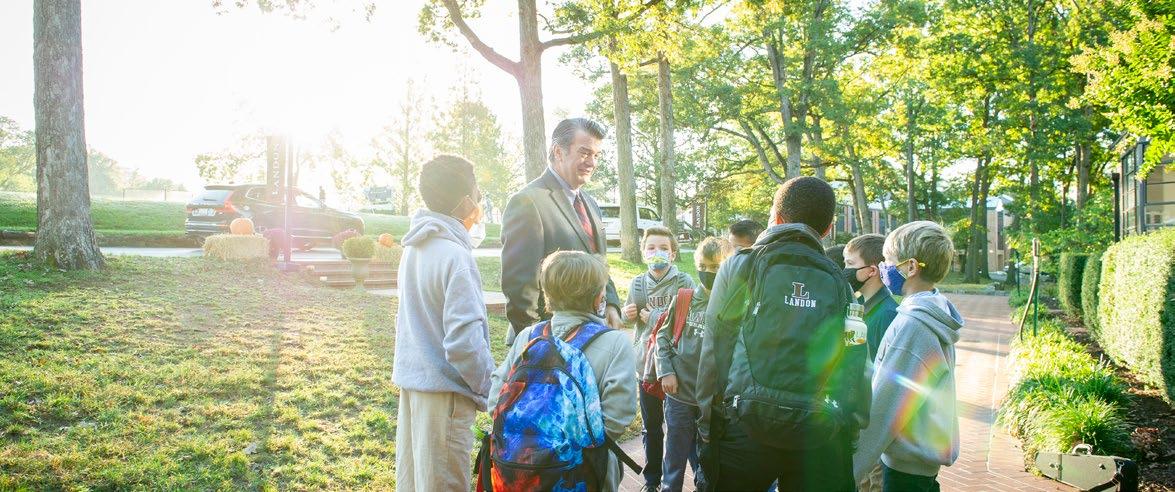
Students develop a strong sense of personal honor to guide and enrich their lives in an increasingly complex society. Within Landon’s diverse community, students share common experiences
that help prepare them for leadership in tomorrow’s world. By doing so, students come to appreciate differences and to cultivate relationships based on mutual respect. The Character Pledge, which brings together the values of the Civility and Honor Codes, provides a model for daily ethical conduct. All members of the Landon community – faculty, staff, students, parents and alumni –are expected to conduct themselves honorably and support the mission statement of the School.
Landon seeks to instill in its students the courage and confidence to voice their convictions clearly, honestly, and respectfully. This goal is best achieved in an educational community characterized by open discussion in small classes conducted by dedicated, caring teachers, with whom students are encouraged to develop meaningful relationships. These
connections are facilitated by faculty serving as advisors, coaches, and mentors.
In addition to their rigorous study, Landon boys build friendships and skills by participating in a variety of co-curricular and extracurricular activities, in which they learn to work cooperatively toward group goals. They develop their creativity and an appreciation for artistic expression through a required course of study in both the visual and performing arts. They assume social responsibility through a voluntary program of service to others, both on and off campus. Finally, Landon requires daily participation in athletics –either interscholastic or intramural – that emphasizes teamwork, sportsmanship, skill development, and personal fitness.
Landon’s teacher-coach-mentor model reflects our commitment to shaping boys ethically, intellectually, socially, and physically.
2 e ducational Values
EDUCATIONAL TECHNOLOGY AND LIBRARIES
The Educational Technology and Libraries Department is comprised of librarians and educational technology specialists whose purpose is to prepare students to participate responsibly and creatively in a continually evolving world by facilitating the learning and use of information and media literacy skills – including
critical thinking, problem solving and communication skills – and educational technology.
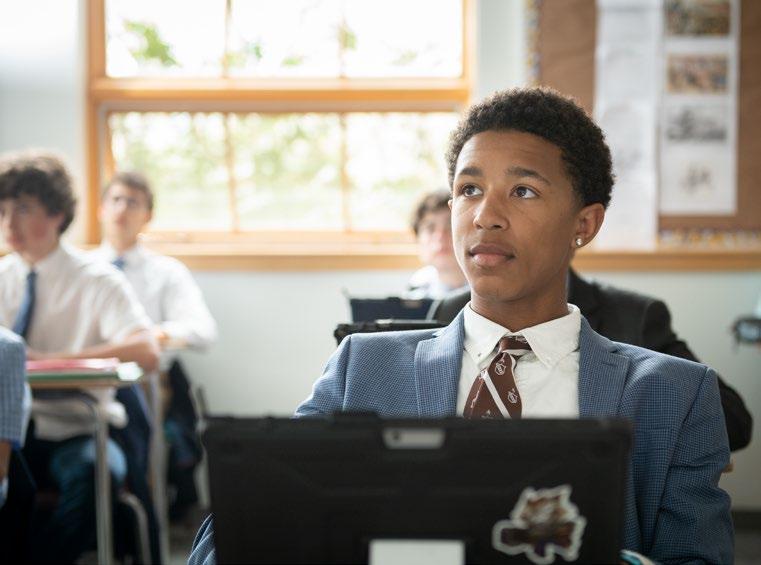
The program seeks to help students become inquisitive, efficient, and ethical users of information, and promotes the value of being lifelong readers and learners.
The program offers students the knowledge, skills, and dispositions necessary to use available tools and resources to reinforce and enhance their education and independent learning, understand community norms for
technology use, and recognize how to create a positive digital imprint.
Librarians and specialists partner with faculty and administration in the planning, teaching and evaluation of the school-wide curriculum. Skills and dispositions relating to reading, research, information and media literacy, and digital citizenship are reinforced from Grades 3 through 12.
Additionally, students can expand their technical knowledge through a variety of technology-based clubs and spaces that promote technological creativity. Reading skills and predilections are also encouraged through a variety of book clubs, reading programs and incentives across the divisions.
LOWER SCHOOL
Through in class instruction and whole division assemblies, students learn about basic computer use, digital citizenship, coding, keyboarding, and research skills.
MIDDLE SCHOOL
The foundations class for Grade 6, which meets once per rotation, includes instruction and practice of foundational skills of information and media literacy skills, and educational technology.
The topics covered include reading appreciation and comprehension; research skills, such as using databases, online searching, evaluating resources, and understanding plagiarism; digital
3 e ducational t echnolo G y and l ibraries
citizenship; character education; online privacy and security; and how to use Microsoft Office 365, email, various educational applications, and the tools and equipment available to Middle School students.
In addition to foundations classes, students are provided instruction, reminders and practice of these skills in a project-based learning environment in coordination with their curricular classes across grade levels.
and how to use Microsoft Office 365, email and various educational applications.
Students are continually provided instruction, reminders and practice of these skills in a project-based learning environment in coordination with their curricular classes across grade levels.

UPPER SCHOOL
In Form III Foundations, students practice essential skills of information and media literacy, and educational technology. Topics covered include reading appreciation; research skills, such as using databases, online searching, evaluating resources, and understanding plagiarism; digital citizenship; online privacy and security;
4 e ducational t echnolo G y and l ibraries
COMMUNITY SERVICE
It is part of Landon’s core mission to develop talented young men not only for lives of accomplishment, but also for lives of responsibility and caring. As a consequence, the school expects its boys to commit to a community service program marked by enduring and wide-ranging opportunities.
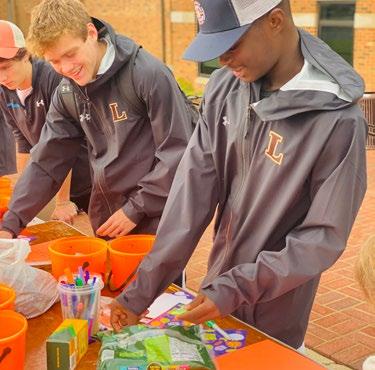
Involvement in these activities helps develop personal attributes and dispositions – civic responsibility, cross-cultural understanding, environmental stewardship, leadership skills, critical thinking, care for place and for others – that are essential to a complete Landon education.
LOWER SCHOOL
Regular community service efforts in the Lower School encourage boys to broaden their awareness of the needs of others, and identify activities in which boys can participate to address those needs. As part of Landon’s extended program of character education, community service in the Lower School stands as an essential part of the division’s curriculum. Whether involved in programs that speak to responsibilities within a larger, global community, or whether serving more local constituencies, participation in community service projects reinforces the importance of the Lower School ethos celebrating honesty, doing one’s best, and looking out for the other fellow, no matter who or where that other fellow may be.
encouraging and facilitating student participation in community service and service learning. To ensure that students understand the connection between serving the greater community and becoming socially responsible citizens, Landon creates, supports and promotes community service opportunities and service-learning reflections that enable students to develop the following skills: the compassion to appreciate the needs of others; the confidence and competence to address these needs appropriately; and the conviction and capacity to serve others in their time and place of need.
UPPER SCHOOL
MIDDLE SCHOOL
Landon Middle School works in myriad ways to fulfill the school’s mission by
Through its ethics program, in-school and extracurricular community service, and service-learning programs, the Middle School, in partnership with its parent community and its student leaders, is dedicated to creating activities and events that help students develop the skills necessary to serve others in our communities.
Though community service participation is not mandatory for boys in the Upper School, the vast majority of students demonstrate that such a mandate is unnecessary; indeed, Upper School boys not only join extant service projects in great numbers, but also create and develop specific areas of service on their own. Those seeking opportunities found through national organizations can aid Habitat for Humanity, the Special Olympics, Operation Smile, and the American Red Cross Blood Drive. Others can engage in local work, such as tutoring at local schools and academic programs; or on-campus programs recently created by students, such as Dodging for Diabetes. In the Upper School, Landon boys are given a great many occasions to serve others, and this activity enables students to practice and develop a disposition of care that endures beyond school requirements and situations. Families are encouraged to consider service experiences when finalizing a student’s academic and athletic pursuits.
5 c ommunity s er V ice
ATHLETICS
LOWER SCHOOL
The Lower School sports program introduces boys to Landon sports; the conduct expected of our athletics; the ideals of sportsmanship, teamwork, fair play, and determination; and some interscholastic competition in Grade 5. In addition to the daily sports program, students are given training in physical fitness and good health habits. Each grade has a weekly physical education class that incorporates topics of health.
MIDDLE SCHOOL
The objective of the Middle School athletics program is to teach and develop skills; to develop the spirit of cooperation, unselfishness and teamwork; and to emphasize sportsmanship, fair play and commitment. Coaches in the Middle School make efforts to play every player in interscholastic competition. Tryouts exist to determine the appropriate level of the boy and to make cuts from interscholastic teams. Many Middle School teams make cuts as there are limits on space and team sizes, but coaches aim to err on the side of inclusion when possible. We do not have an intramural program. Students who do not make their first choice team move to either another, larger team that does not have cuts or to strength and conditioning. Interscholastic competition is arranged with schools having similar athletics philosophies to allow Landon boys to apply individual skill, cooperate as a team, develop community pride, and – most importantly – learn the lessons of fair play. In addition to these physical endeavors, the program is supplemented
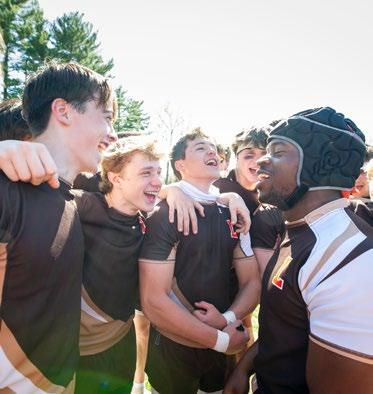
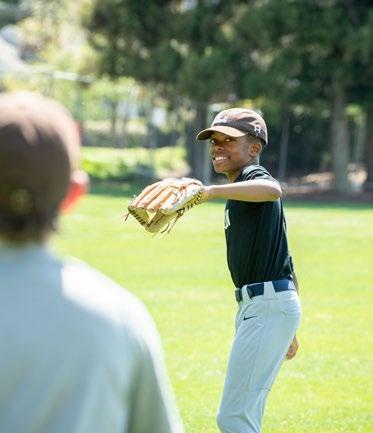
with a health and wellness class. Meeting once per academic cycle, the class enables boys to study various aspects of physical well-being, nutrition, safety, and exercise.
UPPER SCHOOL
The Upper School athletics program holds that every boy should participate in sports every day, whether the participation is individual, intramural or interscholastic; in this way, athletics are best described as “co-curricular.” Participants aim to develop athletic skills and coordination, cultivate a disposition that embraces teamwork and cooperation over individual achievement, find opportunities for enjoyment and satisfaction within sporting pursuits, and appreciate the values of perseverance and effort necessary to meet goals within friendly competition. Because athletics are required, the Upper School will provide a reasonable variety of interscholastic and on-campus sports in order to meet the needs of boys with varying levels of ability and interest; at the same time,
the Upper School does promote active participation and full involvement of boys within the spectrum of available offerings, be they interscholastic or not. Upperclassmen who are engaged in a high-level and intensive sports program outside of school, especially those Landon does not offer, will, in certain limited circumstances, be able to apply for a one season exemption through a program called Contract Athletics. While competition is an essential component of the sports program, winning is the byproduct of an approach to athletics that privileges good sportsmanship, fair play, and the involvement of as many boys as possible in practices and games. Finally, because Landon endorses the concept of teachercoaches, the sports program endeavors to provide a unique teaching situation whereby boys and their faculty-coaches share in vigorous athletics activities that bring out the best in all participants and support the school’s ethical mission to develop honest, respectful young men of integrity. Families are encouraged to consider the co-curricular athletic commitments when finalizing a student’s academic course load.
6 a thletics
ENGLISH
The Landon English Department teaches the art of language and with it the power to interpret and communicate. We emphasize creative and critical thinking and encourage students to practice articulating their ideas with passion and clarity.
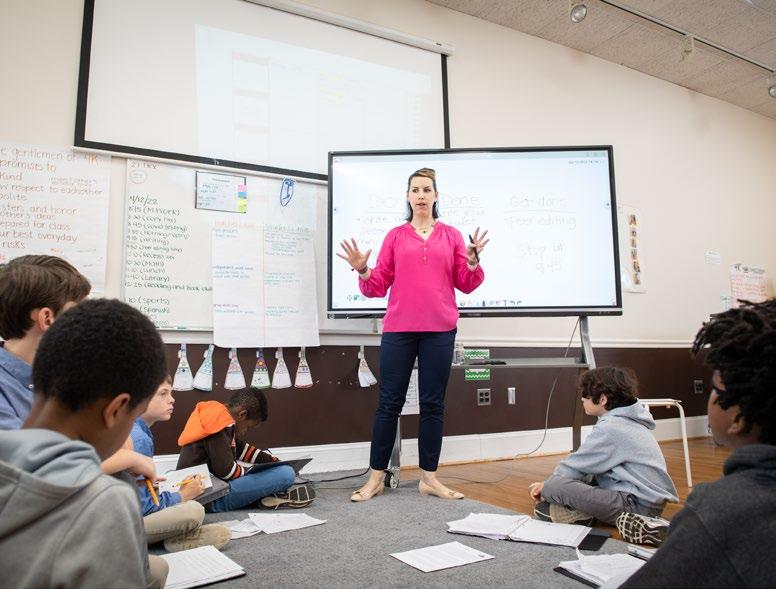
Through literature, they connect with experiences from diverse cultures, time periods, and geographical origins. It is our hope that they leave us equipped with the tools of responsible citizenship: discernment, compassion, empathy, and a capacity for meaningful expression.
To these ends, our courses are crafted to challenge each student to find his voice and to expand his understanding of the worlds within and beyond him. Students develop analytical skills by reading stories, novels, drama, and poetry, as well as essays and other works of non-fiction. These texts provide opportunities for investigation and growth. Students write often and practice their craft, approaching it from various perspectives and developing confidence with different modes of expression. They rehearse elements of grammar and mechanics while mastering the expression of complex and profound ideas. They reflect and interpret, developing an awareness of the nuances of language. In class discussion, they challenge themselves to voice opinions, share ideas, and ask questions. They learn to listen. English courses demand that participants synthesize information and evaluate evidence, and they ultimately empower our students to speak and write freely, logically, thoughtfully, and with purpose.
LOWER SCHOOL
English
Reading and Language Arts are essential tools vital to the academic growth of every student. At Landon, we strive to create a print-rich environment that encourages students to explore the world around them through a variety of genres. With direct instruction in phonics, vocabulary building, fluency, and comprehension, Lower School students grow into adept readers. We incorporate technology to facilitate the application of reading techniques and to tap into the strengths and needs of our diverse learners. Through mini-lessons in
reading workshop, students are explicitly taught key reading strategies so that they can become confident, proficient, and independent readers. The same approach holds true for writing workshop where students thoughtfully use the writing and editing processes to stretch their expository and creative writing. Using a balanced literacy approach allows students to read in small groups, practice word work, share their thoughts through writing and partner talks, listen to read-alouds, and spend valuable time independently reading. Teacher readalouds are an important component of our literacy program. During this time, teachers can model key reading strategies that all good readers use.
7 e n G lish
BELOW IS A BRIEF DESCRIPTION OF THE ENGLISH FRAMEWORK.
Reading Workshop
Reading workshop helps students become actively engaged, purposeful, independent readers. Through hands-on activities and interactive mini-lessons, students are given the tools needed to determine important information and to navigate through complex text.
The Units of Study in Reading by Lucy Calkins is systematically designed to encourage students to develop an appreciation and a method for reading a variety of genres, which include but are not limited to historical fiction, fantasy, nonfiction, and biographies. In Grade 4, students read short stories and a variety of novels for focus on specific skills including author’s purpose, character traits, text-based evidence, predictions, and symbolism. In Grade 5, the reading lessons consist of highquality novels, nonfiction, short stories, and poetry. Students learn various close reading techniques to develop a deeper understanding and analysis of a text. Reading workshop allows students extended time to practice reading skills and grow their reading stamina.
Language Arts/Writing
The Lower School language arts curriculum holds that writing and speaking skills are most effectively learned in the context of actual writing and speaking. In Grade 3, heavier emphasis is placed upon the fundamental skills and mechanics of writing, such as punctuation, writing complete sentences, paragraph construction, word choice, and outlining. In Grade 4, the mechanics of writing initiate the school year, and students continue this throughout the school year while also are working to write more complete essays with introductions and conclusions.
In Grade 5, as our students mature, they are granted greater autonomy to produce written documents and become their own editors. The comprehension and analysis of the reading texts serve as the basis for our writing lessons. The focus is on three areas of writing: narrative, informational, and persuasive.
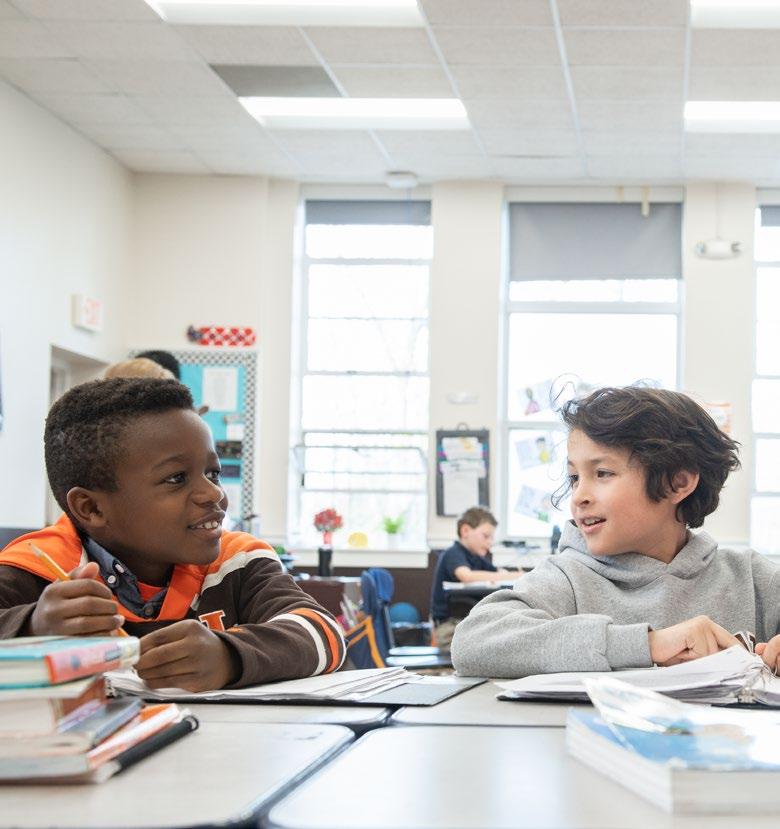
Be Enthusiastic About Reading (BEAR)
Each day the Lower School ends with a 20-minute period of silent, sustained reading or BEAR. Lower School students use this time to practice all of the reading strategies they have learned using high-interest text. Students also receive regular grammar instruction.
MIDDLE SCHOOL
Grade 6 English
Grade 6 English is a reading and writing course that generally follows the thematic approach of the Social Studies class that focuses on Ancient History. We begin with Greek myths and continue with the reading of novels, poems, short stories, and speeches, as well as completing short writing assignments and more substantive papers. Additionally, we will use the readings to from our study of vocabulary and grammar, utilizing IXL, an online program that draws from personalized content to differentiate learning while guiding our understanding of grammar.
8 e n G lish
Form I English
The Form I English program balances the cultivation of classroom and study skills with the investigation and interpretation of several genres (drama, poetry, fiction, and nonfiction) and the development of creative and analytical writing techniques. Overarching curricular themes include transition, transformation, and journeying, with an attempt to draw from global literature when possible to align with ideas presented in students’ World Geography classes. Students also cultivate their objective writing skills by studying vocabulary, grammar, and usage. Through classroom discussion and journaling, students learn to use and move beyond the factual elements of literature in order to make connections between ideas, to relate a text to personal experience, and to interpret passages for literary significance.
Form II English
Form II English continues to develop boys into strong readers and proficient writers. Students review, analyze, and
interpret literature, including a variety of contemporary and classic fiction, a biographical graphic novel, and Shakespeare. These works are written by diverse authors whose themes range from social justice, systemic racism, the human condition, and magical realism. In addition to enhancing their reading comprehension, students develop vocabulary, and improve their grammar, usage, and annotation skills. The boys also prepare for a rigorous public speaking unit that culminates with a valuescentered ethics speech.
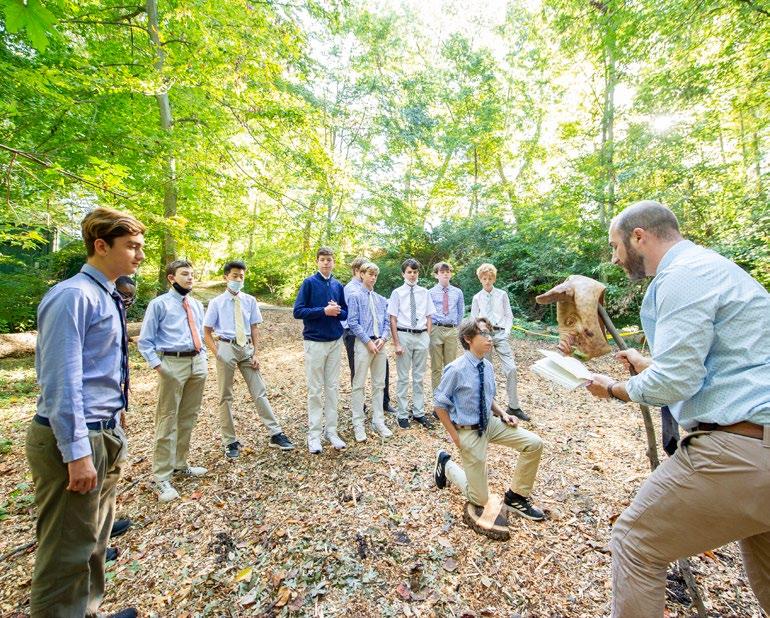
UPPER SCHOOL
E310 – English I (Required of Form III)
ONE CREDIT, YEAR COURSE, SEVEN PERIODS OVER A TEN-DAY CYCLE
In this course students practice essential reading and writing skills, sharpening their critical thinking through close reading of texts and frequent composition exercises in a variety of rhetorical modes. They are challenged
to engage in imaginative discussion and to express themselves articulately. They continue to develop their skills in grammar, mechanics, and vocabulary. Students explore a selection of poetry and short fiction, designed to reveal the many voices of a colorful and diverse world. They also read several longform works, some from the traditional canon and some by emerging voices in contemporary literature. Most recently, these have included two plays, Shakespeare’s Macbeth and Sophocles’ Oedipus the King; Cherie Dimaline’s dystopian novel The Marrow Thieves; Jason Reynolds’ novel-in-verse Long Way Down; and Kevin Panetta’s comingof-age graphic novel Bloom.
E410 – English II (Required of Form IV)
ONE CREDIT, YEAR COURSE, SEVEN PERIODS OVER A TEN-DAY CYCLE
A survey of American literature since Colonial times, this course emphasizes the further development of reading and writing skills based on the study of works of American literature in an historical context. The U.S. history and English curriculum intersect at several interdisciplinary historical junctures. In this class, students read stories, poems, and several works of fiction and non-fiction. They develop their understanding of vocabulary, grammar, mechanics, public speaking through regular writing assignments of varying lengths, including a research paper and some non-traditional assessments.
E510 – Humanities: English Component (Required of Form V)
ONE CREDIT, YEAR COURSE, SEVEN PERIODS OVER A TEN-DAY CYCLE
This interdisciplinary course is designed to promote critical inquiry into the foundations of Western intellectual and artistic culture. Students will study major ideas that shaped human conversation
9 e n G lish
from the Classical period to the 21st century through history, literature, art, and music.
This course focuses specifically on the human condition in Europe but also emphasizes the effects, both positive and negative, of the globalization of the West across time and space as well as the paradoxes and tensions – the intersection of the great heights of Western thought with an understanding of how progress fell short of its ideals – inherent to the development of Western Civilization to provide a clearer picture of where we are today.
Critical thinking skills are emphasized in readings, writing assignments, and classroom discussions. A major goal of the course is to develop the student’s ability to think across disciplines and synthesize material. Humanities is taught by members of the English and History Departments with occasional assistance from members of the art and music faculty.
EJ0.5 – Journalism (All Forms)
ONE HALF CREDIT, YEAR COURSE, FOUR PERIODS OVER AN TEN-DAY CYCLE
Prerequisites: Permission of the instructor based upon teacher recommendations. Re-enrollment after the first year will depend upon previous performance.

Note: Course credit does NOT count towards meeting a student’s English graduation requirement.
This course is designed to expedite the production, facilitate the communication and teamwork, and improve the quality of the Landon News, Landon’s student newspaper. Students practice layout, photography, and reporting skills, and examine various types of journalistic writing: interview, editorial opinion, features, sports, and
hard news. Special attention is given to revision and editing. Leadership, organization, management, and team skills are emphasized. No prior experience on the news is necessary. Assignments and standards are gradelevel appropriate.
E611/612 – Senior English Seminar (Required of Form VI)
ONE CREDIT, TWO SEMESTER COURSES, SEVEN PERIODS OVER A TEN-DAY CYCLE
Senior electives are one semesterlong, and each senior will take one each semester. These classes build on previously established skills and allow students the opportunity to study in a class focused on a particular author, theme, craft, genre, or literary period. Students will rank their preferences and be placed by lottery into one of their top choices. Some recent offerings include the following: The American West, Page to Screen; How the News Media Shaped American History; Black
Voices; The Films of Kurosawa; and 20th Century Southern Literature.
10 e n G lish
HISTORY
It is the goal of the History Department to empower students who can read, write, think and speak with both clarity and thoughtfulness. It is our collective hope that Landon students will develop an appreciation for historical reflection based on empathy towards and inquiry into the myriad contours of history that our program provides.
The History Department fully recognizes that we are teaching in an ever-changing context. The rate at which information is disseminated, and the speed and ease with which it can be accessed, is unprecedented. Ease of accessibility to myriad forms of information will only continue to increase going forward. To that end, we have three areas upon which we focus. Firstly, we consider the fundamentals of historical inquiry to be paramount. Specifically, reading comprehension, expository writing, factual retention, geography, and an awareness of current events are systematically and progressively taught throughout the history program. Secondly, the seemingly endless reach of the internet, and emergent digital technologies, create both advantages and challenges for the 21st century student of history. Lastly, we believe firmly in the relevance and importance of Landon’s mission statement, Honor Code and Civility Code, and that the study of history can be augmented by applying the principles of said statements.
and cultural changes) and Grade 5 (historic events in U.S. history through the buildup to the Civil War) through the lens of Maryland. There is a comprehensive field trip experience tied to the study of Maryland.
Grade 4
LOWER SCHOOL
Grade 3
Grade 3 boys start with a sense of location and history close to home. The year is dedicated to the study of Maryland. Boys learn geography, history, and the themes that they will encounter in Grades 4 (population
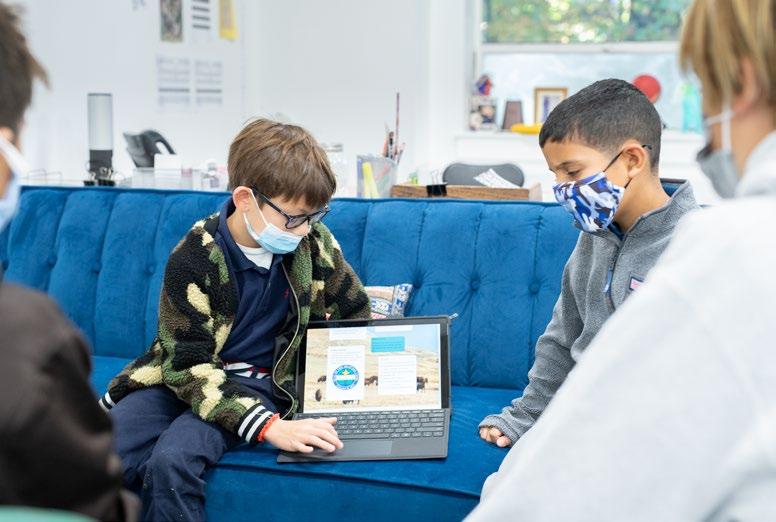
Grade 4 boys learn about global and ancient civilizations over the course of history to better understand their own identities and those of others. The course incorporates history, hands-on learning and projects, opportunities for discussion on current events and the practice of essential executive function skills particularly while undertaking research projects.
Grade 5
Using the Discovery Education Techbook, Grade 5 boys begin their study of United States history from colonization to the buildup to the Civil War. Grade 5 boys also learn about global history during the same period to offer context for the evolution of our young nation. Boys develop note-taking and summarizing skills as well as research techniques. The year concludes with the World Peace Games, a hands-on geo-political simulation where students are assigned roles as nations and put through a series of challenges with the single goal of achieving world peace.
11 h istory
MIDDLE SCHOOL
Grade 6 Ancient History
This course takes a thematic approach to the study of Ancient History. Students trace the development of civilizations across the globe, including Egypt, Greece, China, Africa, India, and the Americas. Writing, annotating, public speaking, and study skills are emphasized.
Form I Geography
Students study the physical and cultural geography and diversity of various parts of the world. They explore history and culture of Africa, Asia, and Southwest Asia in comparison to present geographical studies. Emphasis is on map skills, universal and specific social problems, and non-Western culture. Writing, annotating, research, discussion, and study skills are emphasized.
Form II United States History & Civics
Students explore different topics in American history through the lenses of citizenship and civic responsibility on local, regional, and national levels. After learning and analyzing the structure of the U.S. government, students consider the role of the government in addressing national issues. In a culminating project, students identify an issue in their own communities and design a solution. Writing, annotating, research, debate and study skills are emphasized.
UPPER SCHOOL
HAG611 – American Government (Forms V and VI)
½ CREDIT, FALL SEMESTER, SEVEN PERIODS OVER A TEN-DAY CYCLE
This course has two components: an American government survey and its application to current event issues. The curriculum focuses on the fundamental principles of individual rights, federalism, and separation of powers as applied to American domestic and foreign policy. This class also takes advantage of the school’s location in the nation’s capital, with appropriate speakers and field trips to complement course study. Students may elect to sit for the AP exam.
HAG851 – American Government, Advanced (Form VI)
½ CREDIT, FALL SEMESTER, SEVEN PERIODS OVER A TEN-DAY CYCLE
This Advanced Course in American Government will have students read several different kinds of texts focusing on the underlying political-theoretical origins of the government and ‘regime’ of the United States of America, the logistical and theoretical problems of American politics, and an examination of the fundamental concepts in American political science. These readings will include John Locke’s Second Treatise of Government, the essential founding documents of the nation – the Declaration of Independence, many of the Federalist Papers, and the Constitution of the United States of America. Additional topics will include the functioning of Congress and Congressional politics, Executive branch, federalism at the state and local levels, electoral systems and voting behavior, interest groups and the media, parties, public policy, and foreign policy. While we maintain a fast pace for the course, the boys will continue to refine their speaking, arguing, and framing skills.
Above all, the boys will improve their writing skills through short and mediumlength essays with an expectation to produce college-level work by the end of the semester.
HCL612 – Constitutional Law Seminar (Forms V and VI)
½ CREDIT, SPRING SEMESTER, SEVEN PERIODS OVER A TEN-DAY CYCLE
This course focuses on landmark U.S. Supreme Court cases that have shaped the development of American Constitutional Law. Representative topics include: freedom of speech; the constitutional separation of church and state; the constitutional principles governing police searches and seizures; the various procedural rights accorded criminal defendants under the concept of “due process”; the death penalty; the right of privacy and abortion; equal protection; and affirmative action. As we examine these areas of law, we also consider various theories about the role of the Supreme Court in a democratic society. We look at the composition of the current Supreme Court, with a focus on the judicial style and personality of each justice. This is a seminar, not a lecture course. As such, active participation is imperative. Students are responsible for reading, presenting and debating actual Supreme Court opinions. The readings are demanding and require careful analysis and close attention to detail. Prior enrollment in American Government is recommended, but not required.
HCGI310 – Contemporary Global Issues (Required of Form III)
ONE CREDIT, YEAR COURSE, SEVEN PERIODS OVER A TEN-DAY CYCLE
This course prepares students to intelligently discuss the issues, problems, and events in our world today from a local, state, national, and international perspective. Emphasis will be placed on the inter-relationship
12 h istory
of concepts from across history and the social sciences, from geography and civics to economics and political science. Additionally, students will develop organizational, note-taking, communicating, research, critical thinking, as well as informational literacy skills. This course uses newspapers, online media, political cartoons, and newscasts to support class discussion. Students work with primary source materials and opinion pieces, participate in group projects and presentations, to better understand the world around them.
HEA611/612 – Economics in Action (Forms V and VI)
½ CREDIT, FALL OR SPRING SEMESTER, SEVEN PERIODS OVER A TEN-DAY CYCLE
Prerequisites: Teacher recommendations with the approval of the department chair.

This course will examine how economic principles play out in modern American life. What can be done about poverty in America and why does it exist? How do interest rates impact your economic future? Why is the United States government in so much debt and does it matter? Should the minimum wage be raised or eliminated all together? Is the National Basketball Association’s salary cap a fair and just way to determine compensation for an organization? You will encounter questions like these and others as you engage with the news and your own economic future. This course will help you figure out your answers to questions like these through a four-step process of 1) learning the fundamentals of the economic principles at play, 2) learning about the history of the topic, 3) evaluating the current discussion and debate around them, and 4) presenting your view of what should be done. Reading assignments, turning in written work, and lively class discussions and presentations will be three key features of this course.
HGE611/612 – Global History of Energy Since the Early 19th Century (Forms V and VI)
½ CREDIT, FALL OR SPRING SEMESTER, SEVEN PERIODS OVER A TEN-DAY CYCLE
A history elective focused on introducing students to the socioeconomic, geopolitical, cultural, ethical and environmental impact of energy on society since the early 1800s. The goals of the course are to help students understand the critical role energy has played in modern world history and provide them with a sense of the challenges and opportunities that lie ahead. Topics will be examined in chronological order, with developments in the field of energy studied parallel to major trends in history. Other aspects of the course will include biographies of major figures, such as Andrew Carnegie and Elon Musk, a debate project, guest lecturers from the industry, and a trip to a power plant.
HHR611/612 – The Holocaust and Resistance to Nazi Occupation (Forms V and VI)
½ CREDIT, FALL OR SPRING SEMESTER, SEVEN PERIODS OVER A TEN-DAY CYCLE
This elective will give students, who will be familiar with the topic of the Holocaust from earlier history classes, the opportunity to dig deeper into the Holocaust, as well as movements that arose to resist Nazi policies during the first half of the 20th century. This discussion-based seminar course will incorporate reflective writing, discussion and debate, and readings such as John Steinbeck’s The Moon Is Down and Art Spiegelman’s seminal graphic novel, Maus. The semester will combine two thematic units: (1) the Holocaust, and (2) Resistance to Nazi Occupation. Through these themes, students will explore such topics as the social and political climate that led to the rise of Nazism; the historical context of centuries of Jewish persecution throughout Europe; the human behavior and social psychology concepts that caused so many people not to resist Nazi policies; the groups
13 h istory
and individuals who worked behind the scenes to stop Nazism from spreading and to protect people when it did; and ways that Jewish populations themselves resisted throughout the Holocaust. If time permits, we will also look at the aftermath of the Holocaust and World War II, focusing on the feelings of antisemitism that persisted after the fall of the Third Reich.
H510 – Humanities: History Component (Required of Form V)
ONE CREDIT, YEAR COURSE, SEVEN PERIODS OVER A TEN-DAY CYCLE
Humanities: History Component is required of all Form V students. This course is designed to promote critical inquiry into the foundations of Western intellectual and artistic culture. Students will study major ideas that shaped human conversation from the Classical period to the Twenty-First century through history, literature, art, and music.
This course focuses specifically on the human condition in Europe but also emphasizes the effects, both positive and negative, of the globalization of the West across time and space as well as the paradoxes and tensions – the intersection of the great heights of Western thought with an understanding of how progress fell short of its ideals – inherent to the development of Western Civilization to provide a clearer picture of where we are today.
Critical thinking skills are emphasized in readings, writing assignments, and classroom discussions. A major goal of the course is to develop the student’s ability to think across disciplines and synthesize material.
HLA611 – Latin American History (Forms V and VI)
½ CREDIT, FALL SEMESTER, SEVEN PERIODS OVER A TEN-DAY CYCLE
Drawing upon primary documents, audiovisual materials, and secondary sources produced by historians, this course will survey the history of Latin America from the Spanish Conquest of the major pre-Columbian empires in the early sixteenth century to the present. The course begins with an exploration of the racial, class, and gender hierarchies that emerged out of the region’s colonial and precolonial past. We then examine the struggle to create “nations,” covering topics such as the conservative independence movements and state-formation. The next section will deal with the emergence of a neocolonial order in the nineteenth century, focusing on top-down reforms implemented under liberal oligarchic rule. We will then discuss the ways that popular mobilization against neocolonial social hierarchies led to the refashioning of the “nation” throughout the twentieth century. In this section we will investigate topics such as import-substitution industrialization, populism, corporatism, and the rise of revolutionary socialist movements throughout the region. We will then look at the reactionary suspension of democratic politics and repression of the left by bureaucratic-authoritarian regimes. The next section will focus on the Washington consensus and neoliberal economic reform. The final portion of the course will address the long process of democratization throughout the region, taking note of the struggles of many countries to move towards consolidation.
HPT852 – Political Theory, Advanced – “Philo-sophia: Eros, Reason, and Justice” (Form VI)
½ CREDIT, SPRING SEMESTER, SEVEN PERIODS OVER A TEN-DAY CYCLE
This is an advanced course in political theory that will introduce the essential elements of political philosophy and political theorizing. How should humans
live? What is justice? How should a political community be organized? This course will examine these questions and the interrelated topics of justice, love, and politics through the prism of a classic work of political philosophy and shorter contemporary texts. This term the students will read the entirety of Plato’s Republic interspersed with contemporary texts. The Republic and the rest of the course’s texts treat essential questions that drive human life and politics, describe the essence of education in a political community, and pits the essential competing understandings of justice against each other. As a class, we will use this ancient text to examine these questions and topics as they play out in the contemporary American political, social, cultural, and economic debates. Assessments will take the form of short and medium-length papers and presentations with an expectation that the boys will produce college-level work by the end of the semester.
HHD612 – Political Transitions: Democratization or Collapse and the Return to Authoritarianism (Forms V and VI)
½ CREDIT, SPRING SEMESTER, SEVEN PERIODS OVER A TEN-DAY CYCLE
This course begins with an examination of democracy as a concept that has had varied meanings and interpretations across time and place, and subsequently explores how it has been appropriated by competing forces in their efforts to establish legitimacy in the political arena during the twentieth and twenty-first centuries. Drawing from the theoretical literature and country case studies throughout the world, we will attempt to identify the conditions that make it possible for countries to transition from authoritarianism to democracy, the factors that have a favorable or deleterious impact on the consolidation of democracy, and the variables that can lead to the failure of nascent democratic
14 h istory
movements or the breakdown of existing democratic institutions. Our case studies will be temporally, geographically, and politically diverse. We will begin with an exploration of democratization efforts following the collapse of continental European empires in the early twentieth century, then focus on efforts at establishing democracies in the post-colonial societies that emerged in Africa and Asia after World War II. From there, we will conduct an analysis of the transitions from military dictatorship in Latin America and the Caribbean that occurred during the 1970s and onward, followed by an investigation of the aftermath of the collapse of Communism and the Soviet Union in Eastern Europe in 1989. Lastly, we will discuss the state of democracy in the world today, surveying the various regions previously discussed earlier in the course, to determine if democracy has been consolidated both procedurally and substantively, or if challenges, both old and new, persist.
HP610 – Psychology (Forms V and VI)
ONE CREDIT, YEAR COURSE, SEVEN PERIODS OVER A TEN-DAY CYCLE
Psychology is a survey course intended to provide students with a broad introduction to the study of human behavior and the mental processes that drive it. The primary goal is to leave the boys with a thorough and balanced base of knowledge in the field. We start the year with Psychology’s roots as a field, utilizing the scientific method, correlation & experimentation, statistical reasoning, forensic psychology, biological psychology and neurotransmission, the nervous and endocrine systems, an overview of the brain, the cerebral cortex, the biology of consciousness/states of consciousness, and the biological bases of behavior. As the year progresses, we move into sensation and perception, learning and motivation, sports psychology, and emotion and stress. We end with a deep dive into psychological disorders and corresponding treatment options.

HSJ611/612 – Race, Gender, and Sports (Form V and VI)
½ CREDIT, FALL OR SPRING SEMESTER, SEVEN PERIODS OVER A TEN-DAY CYCLE
Several of today’s sports superstars have used their voices and platforms to raise awareness and generate support for disadvantaged groups and communities. We have all seen the impact that people like Colin Kaepernick, LeBron James, Chris Paul, Megan Rapinoe, Maya Moore and many others have had on the public discourse surrounding race relations and gender equality. While impressive these efforts are not new. This course will examine the activism of today’s’ athletes, and also take a close look at athletes of the past who used their platforms to promote positive change, such as Jim Brown, Kareem Abdul Jabbar, Billie Jean King, Jackie Robinson, Martina Navaratilova, and Muhammad Ali. We will explore the impact of social media on the efforts of today’s athletes, and also touch on race, gender and sports from a global perspective.
15 h istory
HUS410 – U.S. History (Form IV, V, and VI)
ONE CREDIT, YEAR COURSE, SEVEN PERIODS OVER A TEN-DAY CYCLE
This course is a survey of United States history examined thematically. Students become familiar with the texture of American history through close reading of texts, in-class discussion, writing interpretive essays, and making oral presentations. A variety of materials are used to complement the text.
HUS850 – U.S. History, Advanced (Form VI)
ONE CREDIT, YEAR COURSE, SEVEN PERIODS OVER A TEN-DAY CYCLE
Prerequisites: Teacher recommendations with the approval of the department chair.
This course is designed to provide motivated students with the opportunity to study American History with a thematic approach, as opposed to a traditional, chronologically linear survey course. Each unit of study will address a different theme and follow said theme throughout the entirety of American history. Students will have already taken US History Survey during their sophomore year and this will allow them to replicate the college history major experience by studying themes such as the American Presidency, American Culture, Labor and Immigration, Women’s History, Diplomatic History and Military History in greater depth. By the end of the year students will have been exposed to several relevant areas of American history in a manner that will prepare them for semester-long seminar courses in college at the 200 level. Assessments will include frequent quizzing, expository essays, graded in-class discussions and a research paper of significant length.
HWARME612 – U.S. Wars in the Middle East (Forms V and VI)
½ CREDIT, SPRING SEMESTER, SEVEN PERIODS OVER A TEN-DAY CYCLE
This course will cover our country’s involvement in wars and insurgencies in the Middle East beginning with our effort, along with allies, to remove the Iraq military from Kuwait after Iraq’s invasion of Kuwait in August 1990. That brief and successful military action will be followed by an in-depth study of the events leading up to and on 9/11-2001. We will then focus on the chase for Osama bin Laden and Al Qaeda and the ousting of the Taliban from Afghanistan. The mishandled Iraq War of 2003 will follow and its mismanagement would lead to the rise of the Islamic State in Iraq and Syria. Our military’s involvement in destabilizing and destroying ISIS will be then covered. Finally, we will review the U.S.’s continuing efforts in Syria to bring some stability to the region and the continuing tensions with Iran.
In addition, we will examine Jihadi’s attack against our country in other lands such as in Lebanon, Scotland, Somalia and Yemen; and such attacks in our country such as in Fort Hood, Texas, at the Boston Marathon, in San Bernardino, California, and Orlando, Florida.
HViet611 – The Vietnam War –Immediate and Lingering Effects on Our Country (Forms V and VI)
½ CREDIT, FALL SEMESTER, SEVEN PERIODS OVER A TEN-DAY CYCLE
It was a war that destroyed one Presidency, and probably another. It was a war that was passionately opposed by hundreds of thousands of Americans. It was a war that was never declared and probably never could have been won.
It was a war that ended in humiliating defeat for our country despite never losing a battle. It was a war that was largely fought by less advantaged
Americans and largely avoided by advantaged Americans. It was a war that encompassed a year – 1968 – unequaled for its impact in any previous year of our history save for 1776 and 1861.
The course will cover why we went there, how we left there, and explore the strategy, the battles, the troopers who fought those battles while we were there. It will cover the French and Japanese control of Vietnam before our country became involved; the inequity of the draft; the agony of the 1960s; the riots; the assassination of John Kennedy, Martin Luther King, and Robert Kennedy; our prisoners of war; the resulting devastation of North and South Vietnam; and our country’s loss of innocence.
16 h istory
MATHEMATICS
Mathematics is about recognizing form and pattern. The symbols and notation used to organize, manipulate and explore these patterns can seem arcane and divorced from reality for students at times. It is the department’s goal to consistently remind students of the connections between the material presented and real-world problems.
But the discipline should not be thought of as simply a tool for scientists to communicate with, a mere means to an end. Mathematics has the unique privilege in American curricula to introduce students for the first time to a complete and coherent system of deductive reasoning. This exposure to the precepts of formal logic and valid argument not only benefits students’ development as mathematicians but is part of their more general liberal arts education. To think analytically and, eventually, communicate those ideas in a clear and concise manner, is a huge part of what mathematics courses at Landon are trying to instill. To back up statements with reasons, to give specific examples that clarify generalities, and to
explain concepts from several different perspectives is at the heart of what mathematics encourages.
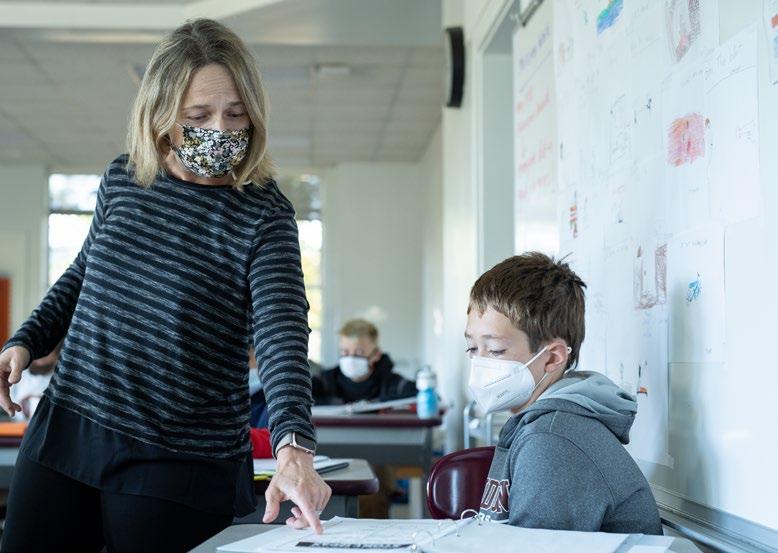
Our practical mission is to prepare our boys to be successful in their college mathematics courses, but our ultimate goal is to make sure students graduating from Landon have the wherewithal to effectively use mathematical ideas and methods in the many life endeavors which require them. To accomplish this, Landon’s mathematics department has the first aim of engendering a love of the subject in our students. Mathematicians and mathematics educators themselves have different reasons for loving the discipline. Many appreciate its formal rigor and seeming lack of ambiguity.
Others revel in its wide-ranging application to almost every pursuit of knowledge, most notably in the natural sciences but just as surely in the social and political sciences. While still others treasure most of all the elegance and purity of a discipline whose claims are unequivocally justifiable. All these reasons and many others may push one towards the study of mathematics, but there is a common thread: the joy of problem-solving. Landon’s mathematics department tries to instill that joy during our students’ formative years, foster it throughout their time at Landon, and encourage them to tackle ever-more difficult problems as their expertise and interests develop.
LOWER SCHOOL Mathematics
The Lower School uses Math in Focus – a Singapore math program. There is an emphasis in each grade on problem solving. Students learn new skills and concepts as well as how to think about their thinking and explain their thinking. The program, in all three grades, begins with manipulatives, moves to visual representations, and then introduces the algorithm. Students receive direct instruction and use hands-on activities to explore new concepts and then begin independent practice.
The Grade 3 math program begins with numbers to 10,000 – counting,
17 m athematics
place value, and ordering them. Then they begin to add and subtract these numbers. Next, the boys learn mental math, estimation, and bar modeling. Multiplication and division are the next units. Money and metrics are discussed, as well as bar graphs and line plots. Customary units of measurements are then introduced. The boys work with fractions, time and temperature, and angles and lines. The use of manipulatives enhances each of these areas as the students become familiar with mathematical signs, symbols, and terms. They investigate ideas, discover patterns, and explore ways to solve problems.
The Grade 4 math program is comprehensive and builds upon skills learned in Grade 3. Students begin the school year working with whole numbers, estimation and number theory, and whole number multiplication and division. They then learn about tables and line graphs, data and probability, fractions and mixed numbers, and decimals. Next, the boys explore angles with perpendicular and parallel line segments, squares and rectangles, conversion of measurements, area and perimeter, and symmetry. The year ends with tessellations.
Relying on the basis established in Grades 3 and 4, boys in Grade 5 continue cumulative review and broaden their studies in problem-solving strategies and applications. Open-ended problems are introduced, and collaborative work is explored. Areas covered: place value, addition and subtraction of whole numbers and decimals, multiplying whole numbers and decimals, calculations with fractions, ratio and percent, geometry, statistics, and probability.
MIDDLE SCHOOL Grade 6 Mathematics
Grade 6 mathematics broadens the students’ awareness and use of numbers of all sizes and types. Students, having acquired a facility and competency with numbers and basic operations, are asked to expand and relate their knowledge and to develop their understanding of different applications to real-world situations.

Form I Pre-Algebra
This course prepares students for Algebra I in Form II. Pre-Algebra helps the student develop understanding of and skills in the principles and methods of mathematics and in their application to a broad range of problem-solving and decision-making situations. Topics covered include positive and negative numbers, the number system, ratios, equations and inequalities, graphing, geometry, and probability.
Form II Algebra I
Algebra I is a comprehensive study of algebraic fundamentals beginning with the basic operations of real numbers and running through the more sophisticated material dealing with quadratics.
Emphasis is on operations with real numbers, solving and graphing linear equations, solving word problems, systems of equations (solving by graphing, addition/multiplication and substitution), exponents, radicals, and factoring. This course prepares students for subsequent courses in algebra and geometry.
UPPER SCHOOL
MAI200 – Algebra, Upper School ONE CREDIT, YEAR COURSE, SEVEN PERIODS OVER A TEN-DAY CYCLE
Prerequisites: Algebra I. The aim of this course is to strengthen algebraic fundamentals that are vital to the entire Upper School mathematics curriculum. Students enrolled in this course have taken Algebra I and will benefit from additional time spent mastering skills and material that they will use in future courses. This class will give students additional exposure to the main topics of algebra including the order of operations, solving equations, and graphing relations. Students will complete an entire Algebra I text and preview, as time permits, several important Algebra II topics. The instructor will also set aside course time to work on particular review topics as seen fit.
18 m athematics
MAI310 – Algebra II
(Required course typically taken in Form III)
ONE CREDIT, YEAR COURSE, SEVEN PERIODS OVER A TEN-DAY CYCLE
This course builds on the foundations of linear and quadratic relations developed in Algebra I and introduces the student to exponential, logarithmic, rational and polynomial relations and functions. Development of fundamental graphing skills is stressed early in the course to allow students the opportunity to begin the exploration of mathematics with the graphing calculator in the later part of the course. Students will need a TI 83/84 graphing calculator.
MALG330 – Algebra II, Honors
ONE CREDIT, YEAR COURSE, SEVEN PERIODS OVER A TEN-DAY CYCLE
Prerequisites: Students must have permission of the department chair.
This is a more rigorous treatment of the subject than the regular course in Algebra II. Added emphasis is put on mathematical structure and as well as independent problem solving. Students should have more highly developed arithmetic and graphing skills since the TI 83/84 graphing calculator will be an important tool used throughout the course. This course is not a prerequisite for taking honors level work in subsequent years.
MC610 – Calculus
ONE CREDIT, YEAR COURSE, SEVEN PERIODS OVER A TEN-DAY CYCLE
Prerequisites: Pre-Calculus or Advanced Pre-Calculus.
This course introduces students to the fundamental concepts of calculus and their applications. The course is intended to prepare the student for calculus at the college level by exposing him to limits, derivatives, and integrals. Students are required to own
a TI 83/84 graphing calculator, which is used throughout this course.
MCAB850 – Integrated Calculus, Advanced
ONE CREDIT, YEAR COURSE, SEVEN PERIODS OVER A TEN-DAY CYCLE
Prerequisites: A minimum grade of 82 in Advanced Pre-Calculus and approval of the department chair.
This course is an introduction to calculus. Topics studied include elementary functions, limits, derivatives, definite and indefinite integrals, and their applications. This is a rigorous course requiring considerable preparation on a daily basis. Students are required to own a TI 83/84 graphing calculator; it is used throughout this course.
MCBC850 – Integrated Calculus with Synthesis, Advanced
ONE CREDIT, YEAR COURSE, SEVEN PERIODS OVER A TEN-DAY CYCLE
Prerequisites: A minimum grade of 82 in Turbo Pre-Calculus with Introductory Analysis and approval of the department chair.
This course is an introduction to college-level Calculus course. In addition to the topics covered in Advanced Integrated Calculus course, students will study vector, polar, and parametrically defined functions, L’Hopital’s rule, and Taylor series, among others. Students are required to own a TI 83/84 graphing calculator; it is used throughout this course.
MCS850 – Computer Science Programming and Coding, Advanced (Forms IV, V and VI)
ONE CREDIT, YEAR COURSE, SEVEN PERIODS OVER A TEN-DAY CYCLE
Prerequisites: Department Chair and Instructor approval.
This course is an introductory course in computer science. It is open to all students
with a strong mathematical background and with the permission of the instructor. The Java programming language is used to develop computer programs and algorithms for solving computation problems. The course emphasizes program design, control structures, algorithm development and analysis, and fundamental data structures.
MGEO410 – Geometry
ONE CREDIT, YEAR COURSE, SEVEN PERIODS OVER A TEN-DAY CYCLE
Prerequisites: Algebra II.
This course will use both deductive and inductive reasoning to develop an understanding of plane and solid geometry. Topics include congruency, inequality, constructions, areas, volumes, and right angle theory as they apply to the traditional geometric figures of points, lines, angles, triangles, quadrilaterals, etc., and their threedimensional counterparts. Additional emphasis and outside work is given to developing proofs of theorems and the foundations of geometry.
MGEO430 – Geometry, Honors
ONE CREDIT, YEAR COURSE, SEVEN PERIODS OVER A TEN-DAY CYCLE
Prerequisites: Students must have permission of the department chair.
This course is for students who are capable of moving at a faster pace, solving longer and more difficult problems, and doing more abstract thinking than the regular geometry course requires. A wider variety of topics will also be offered and the presentation of the subject stresses the structure and concepts to a greater degree. This course is not a prerequisite for taking honors-level work in subsequent years.
19 m athematics
MPC500 – Pre-Calculus
ONE CREDIT, YEAR COURSE, SEVEN PERIODS OVER A TEN-DAY CYCLE
Prerequisites: Algebra II and Geometry.
This is a study of the elementary algebraic and transcendental functions (polynomial, trigonometric, logarithmic, exponential, rational, etc.) and other relations. Students are required to own a TI 83/84 graphing calculator; it is used throughout the course. Students successfully completing this course should be prepared for further study in mathematics at Landon and beyond.
MPC510 – Pre-Calculus with Analysis
ONE CREDIT, YEAR COURSE, SEVEN PERIODS OVER A TEN-DAY CYCLE
Prerequisites: A minimum grade of 85 in both Geometry and Algebra II and the approval of the department chair.
This offers a more complete preparation for calculus, particularly the Advanced Calculus I course. The emphasis is on the study and analysis of functions, particularly polynomial, trigonometric, exponential, and logarithmic functions. Notation and topics used in calculus are introduced and used throughout the course. Students are required to own a TI 83/84 graphing calculator; it is used extensively in this course.
MPC530 – Turbo Pre-Calculus with Analysis, Honors
ONE CREDIT, YEAR COURSE, SEVEN PERIODS OVER A TEN-DAY CYCLE
Prerequisites: A minimum grade of 85 in both Geometry Honors and Algebra II Honors and the approval of the department chair.
This is an Honors course and a more rigorous treatment of pre-calculus including an introduction to the calculus topics of limits and the derivative. Students selecting this option are expected to continue into the more Advanced Calculus II in their senior
year. Students are required to own a TI 83/84 graphing calculator; it is used extensively in this course.
MSt850 – Statistics, Advanced (Forms V and VI)
ONE CREDIT, YEAR COURSE, SEVEN PERIODS OVER A TEN-DAY CYCLE
Prerequisites: Completion of or enrollment in Advanced Pre-Calculus and approval of the department chair.
This course provides students an introduction to the major concepts and tools for collecting, analyzing, and drawing conclusions from data. Most of the course is application-oriented; students learn about exploring data, planning a study of the observed patterns, producing models for investigation, and drawing conclusions from their study. The course may be particularly useful to students planning future study in business, economics, education, psychology, sociology, medicine, and engineering. Students are required to own a TI 83/84 graphing calculator; it is used throughout this course.
MMC850 – Multivariable Calculus and Differential Equations, Advanced - Landon-Holton Coordinate Program
ONE CREDIT, YEAR COURSE, MEETS THREE TIMES PER WEEK IN THE MORNING, 7:10–7:55 A.M.
Prerequisites: Completion of Calculus BC (AP)/Advanced Calculus II and approval of the department chair.
See Landon-Holton Coordinate Program for course description.
20 m athematics
PERFORMING ARTS
The performing arts constitute a vital part of life. Through aesthetic education, Landon provides multiple opportunities for each individual to develop the skills and knowledge necessary for participating fully in the performing arts.
In both rehearsal and performance, students:
• Develop and expand age-appropriate skills in singing, playing musical instruments, and acting, learning to communicate effectively with other performers, directors, and an audience.
• Develop and expand their skills in reading music, scanning texts, deciphering dialogue, and using movement. Graded exercises and practice in reading musical notation, scores, and scripts aid in allowing students to study and understand the culture of times past, present, and future.
• Experience a wide variety of the great repertoire available, in studying and performing the historical and contemporary monuments of music and drama. (Participation in musical performances with varying levels of sophistication is commensurate with age, experience, individual ability, and interest.)
• Develop aesthetic sensitivity and appreciation through listening, improvisation, and performance.
LOWER SCHOOL Music
Music literacy underscores the experience of a Lower School boy. Each homeroom meets for music class twice a week. All grades receive instruction in music theory and in the reading and writing of music. Students are introduced to various instruments and concepts of rhythm, melody, and harmony. Singing is a very important element in class, as are playing recorder and interacting with and writing music using iPad-compatible programs.
In addition, each boy is required to participate in one of three performance ensembles and has the opportunity to perform for parents and the community at large. Lower School Band, String Ensemble, and Chorus each meet once a week. All ensembles are open to all students. The Landon Little Singers is a select performing group that meets before school twice weekly and is open to all Lower School students. This ensemble gives concerts in which a smaller singing ensemble is desired.
Boys who perform in either Band or String Ensembles are required to take a lesson in their instrument. Lessons may be scheduled at Landon for the following
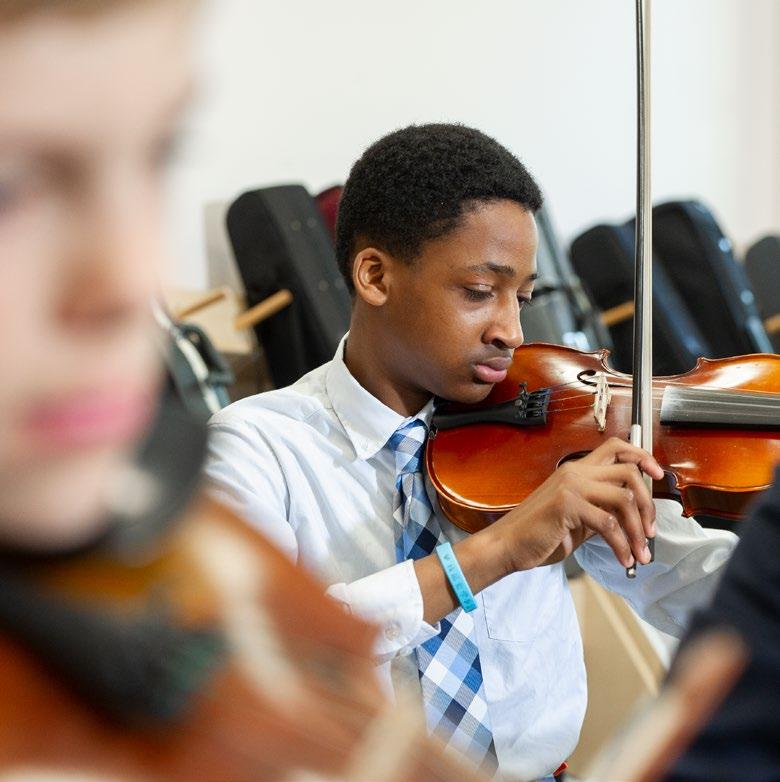
21 Performin G a rts
instruments: flute, clarinet, saxophone, high and low brass, percussion, and string instruments (violin, viola, cello, or string bass). There is an additional fee for half-hour weekly lessons scheduled after school.
Middle School Band
Chorus, Choir, and Glee Club
MIDDLE SCHOOL
String Orchestra
This group of strings players (violin, viola, cello, and bass) performs at events both on and off Landon’s campus. Members study privately with instrumental instructors at Landon or in the community. Classical and contemporary musical repertoire is explored.
Middle School Jazz Ensemble
The Landon Middle School Jazz Ensemble, specializing in American popular music is open to all Middle School students. The group meets after school on Monday from 4–5 p.m.
Middle School Band is a concert band that plays at on campus events as well as area concerts. It is open to students who play an instrument. In addition to their academic class, members of the Band study privately with instrumental instructors at Landon or in the community. The Band performs at area events and gives concerts in the Washington Metropolitan area. Such performances have been at the Kennedy Center, the D.A.R. Constitution Hall, the Organization of American States, and the Pavilion as well as the Maryland State Band Assessments at the district and state levels.
Handbells
Handbells is a performing group that emphasizes note-reading skills, rehearsal and bell techniques. Musical literacy is emphasized through daily rhythmic and sight-reading exercises. As skills improve, the repertoire advances to demand more of each ringer.
Middle School boys have the opportunity for vocal development, applied music literacy, and an appreciation of myriad traditions, composers, countries, and cultures as represented in choral literature. Students are asked to attend and review a choral concert each semester, and they will receive homework assignments to learn how to read music using solfege and what to listen for in classical music. Piano or voice lessons are encouraged.

Middle School Junior Bearitones
Middle School students also have an extracurricular singing ensemble, Junior Bearitones, which meets before school once weekly. All Middle School students are eligible to attend. This small ensemble, like its Lower School Little Singers counterpart, has sung throughout the Washington metropolitan area, including at the Kennedy Center, Washington National Cathedral, and the White House; has performed at Carnegie Hall several times; and contributes to special assemblies and events throughout the year on campus.
Theatrical Arts
This course is designed to provide instruction as well as enjoyment of various aspects of drama. Students will learn basic stage craft and formal voice and acting techniques. The class is open to a limited number of students in Grade 6, Form I, and Form II. Students perform for the entire Middle School at various times throughout the year. Note: Boys do not have to be enrolled in drama to try out for the Middle School LandonHolton plays.
22 Performin G a rts
UPPER SCHOOL
PAAW – Acting Workshop
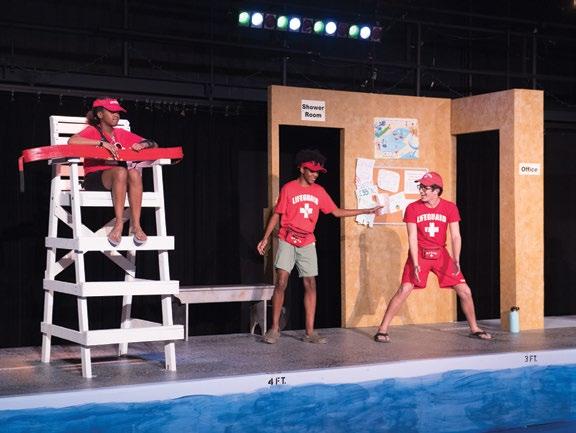
(Forms III, IV, V, and VI)
ONE CREDIT, YEAR COURSE, SEVEN PERIODS OVER A TEN-DAY CYCLE
Over a series of progressive units during this year-long course, students will begin to discover an effective, dependable, and applicable set of tools for the actor in the working theatre company. Students will study a complete spectrum of acting for theatre. From comedy to farce; clowning and improvisation to classical acting; Elizabethan and neoclassical texts, to contemporary drama and movement including physical theatre, mask, stage combat, and even musical theatre. Students develop a real-world set of working tools for the performer, ultimately shaping professional, empathetic, critical, exploratory, and truthful performers. Performances take place in class, during in-school events, and out of school events around the DMV area such as the Folger Secondary Shakespeare Festival each Winter. With the approval of the instructor, this course may be taken all four years for credit.
PAB0.5 – Bearitones
(Forms III, IV, V, and VI)
½ CREDIT, YEAR COURSE, THREE PERIODS OVER AN EIGHT-DAY CYCLE
Prerequisites: Admission by approval of the director and must be enrolled in Chamber Singers.
The Bearitones is a select group of Chamber Singers, who specialize in a cappella vocal works. Bearitones are expected to be able to maintain an independent vocal part. The group’s diverse repertoire includes Renaissance madrigals, Victorian part-songs, and close-harmony arrangements of barbershop, folk, and popular music. Piano or voice lessons are encouraged. Past performances have included school and community venues, pops concerts, regional and state competitions, the White House, and the Vocal Ensembles Night of the Independent Schools Choral Festival.
PACS – Chamber Singers (Forms III, IV, V, and VI)
ONE CREDIT, YEAR COURSE, SEVEN PERIODS OVER A TEN-DAY CYCLE
Prerequisites: Admission by approval of the director.
Members of Chamber Singers work to expand their vocal ability, improve their music reading skills, and learn
the great musical literature written for men’s voices and mixed chorus. Past performances include the Independent Schools Choral Festival at Washington National Cathedral, a December concert, the University of Maryland Men’s Choral Festival, Evensong at Washington National Cathedral, competitive adjudications, the Kennedy Center
Honors Concert, and a spring tour. Recent trips have been to New York, Orlando, Philadelphia, and Chicago. Piano or voice lessons are encouraged.
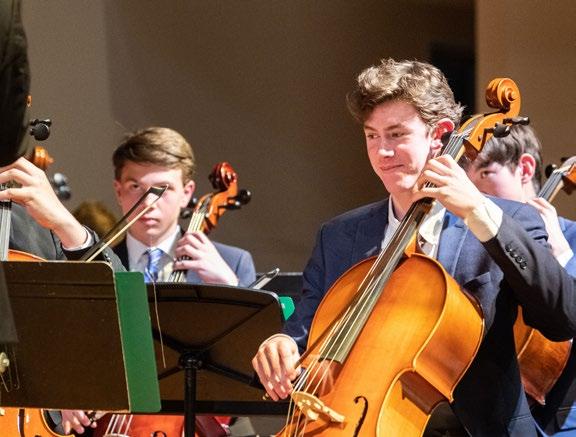
PACB – Handbell Ringers, Concert (Forms III, IV, V, and VI)
ONE CREDIT, YEAR COURSE, SEVEN PERIODS OVER A TEN-DAY CYCLE
Prerequisites: Admission by audition.
This is an advanced performing group of experienced and capable ringers. This ensemble prepares challenging and technically demanding repertoire, building on skills and techniques acquired in prior handbell classes. A variety of performances are scheduled throughout the school year, both on and off-campus, including two to three concerts during the academic year, travel performance opportunities, and the annual WISH Festival in the spring.
23 Performin G a rts
PAHB – Handbell Ringers, Upper School (Forms III, IV, V, and VI)
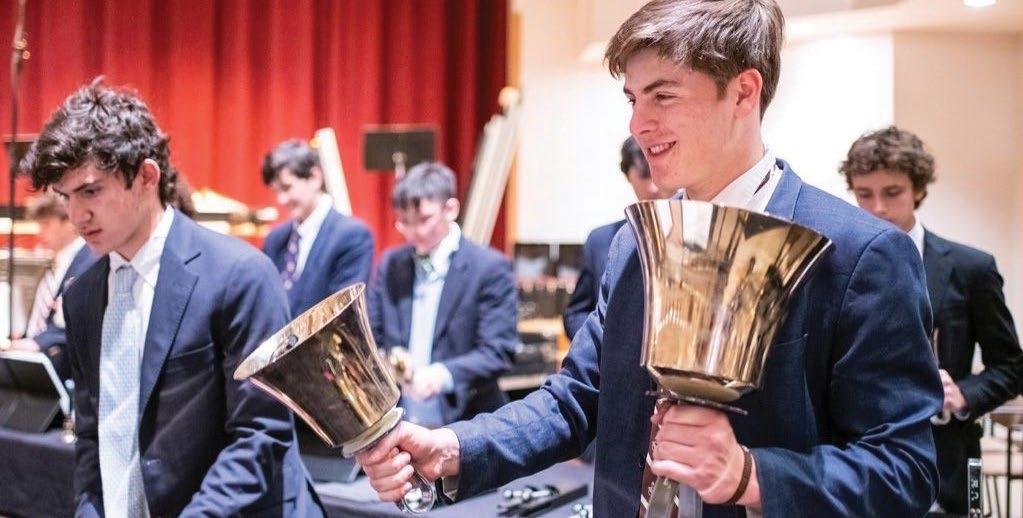
ONE CREDIT, YEAR COURSE, SEVEN PERIODS OVER A TEN-DAY CYCLE
Prerequisites: Admission by approval of the director.
A performing handbell group for experienced ensemble musicians. Appearances within the school and in the surrounding community are a regular component of the course, including one major concert at the conclusion of each term. This group also joins with Landon’s other handbell ensembles in performing at the annual WISH Festival in the spring, as well as performances on campus throughout the year.
PAJE0.5 – Jazz Ensemble (Forms III, IV, V, and VI)
½ CREDIT, YEAR COURSE, FOUR PERIODS OVER AN EIGHT-DAY CYCLE
Prerequisites: All members must be enrolled in Symphonic Band or String Orchestra (with the exception of piano and/or guitar) and take private lessons. Admission by the approval of the director.
The Landon Jazz Ensemble is open to any student who plays an instrument in either the Symphonic Band or String Orchestra and passes the audition. Private instrumental lessons are required and are typically given after school or during study hall periods by one of our Adjunct Music Faculty members. Students are also allowed to study with a non-Landon teacher with the approval of the director. Jazz ensemble specializes in American popular music, from Dixieland to rock. Performances are given throughout the Washington metropolitan area and have included appearances with Wynton Marsalis, the Canadian Brass at the Kennedy Center, the “Best of Washington” fashion show at the Sheraton Washington Hotel, and the “Toys for Tots” event in conjunction with the U.S. Marine Corps. A major highlight of the year is the Jazz
Ensemble’s support of Landon’s “It’s Academic” team on WNBC.
PAStO – String Orchestra (Forms III, IV, V, and VI)
ONE CREDIT, YEAR COURSE, SEVEN PERIODS OVER A TEN-DAY CYCLE
Prerequisites: Lessons and practice required. Admission by the approval of the director. The Landon String Orchestra is comprised of students performing on the violin, viola, cello, and bass. The orchestra performs for activities on and off the Landon campus. Most members study privately with highly experienced and qualified Adjunct Faculty instrumental instructors at Landon; however, study with a teacher outside of Landon is permitted with approval of the director. Students represent a diverse range of skill levels and work together as a team. A string quartet may be formed from the ensemble through the recommendation of the private instructors and the director of strings. Membership in the String Orchestra qualifies students for participation and credit in the Small Ensemble class. In addition, members of the orchestra are permitted to participate in the Landon Symphonette Orchestra (mentored by professional musicians) and the SightReading Orchestra which includes visiting students from Holton-Arms and other schools in the area.
PASB – Symphonic Band (Forms III, IV, V, and VI)
ONE CREDIT, YEAR COURSE, SEVEN PERIODS OVER A TEN-DAY CYCLE
Prerequisites: Admission by the approval of the director. Private lessons are required for membership.
The Landon Symphonic Band is open to any student who plays a Symphonic Band instrument and passes the audition. Private instrumental lessons are required and are typically given after school or during study hall periods by our Adjunct Music Faculty members. Students are also allowed to study with a non-Landon teacher with the approval of the director. Aside from the many seasonal programs, the band performs at various school events and gives concerts in the Washington Metropolitan area. Such performances have been given at the Kennedy Center, the D.A.R. Constitution Hall, and the Organization of American States.
24 Performin G a rts
SCIENCE
An understanding of the natural world and of humanity’s place within it is essential. Therefore, the Landon Science Department aims to foster each student’s inquisitiveness and enthusiasm by building a base of scientific knowledge and skills through lectures, discussions, and hands-on experiential learning.
Landon offers a wide variety of courses so that each student is exposed to the fundamental branches of science at various levels. It is the responsibility of our department to prepare students to be informed global citizens, stewards of the environment, and competent users of technology.
The Landon Science Department is committed to integrating the following into its courses at all levels:
Scientific Knowledge: We present a structured sequence of scientific knowledge to our students, complementing their knowledge in other academic disciplines. Scientific knowledge is organized concepts, theories, and unifying principles, which can lead to testable explanations and predictions about our environment.
Scientific Method: We teach how the scientific method is used to form hypotheses about the world and how these hypotheses are tested through the collection and analysis of data.
Writing Skills and Communication: We guide students to articulate their understanding of science as a process through writing and presentations, conveying knowledge and understanding about the relationships between basic concepts and observed phenomena, in both the laboratory and field settings.
growing plants, and various other targeted activities.
In Grade 3, students study aspects of biology and chemistry, which includes hands-on experiments on animal classification, invertebrate behavioral studies, fingerprinting, and chromatography. They also work on units on mystery solving, food web and adaptations, acid/base studies, and geology.
LOWER SCHOOL
The Lower School science curriculum aims to educate the boys in many different areas of science, while also developing a love and appreciation for nature through the care of and interaction with classroom pets,
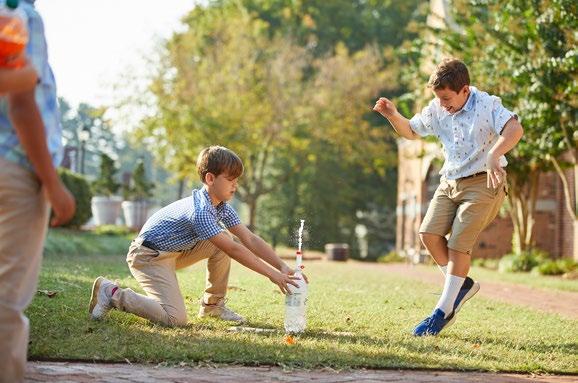
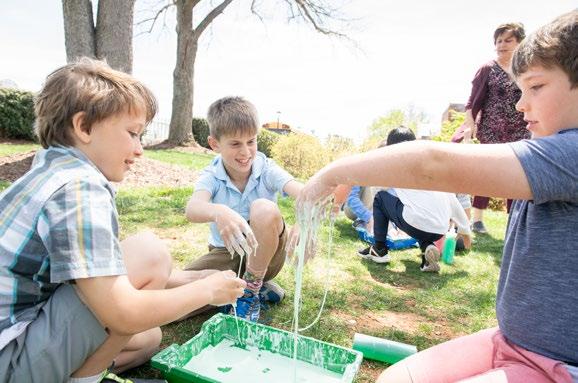
In Grade 4, units focus on biology, chemistry and physics. Concepts emphasized include experimental design, consumer science, nutrition, food webs, and small-mammal anatomy (both through the study of owl pellets), fossils, minerals, and electricity.
The Grade 5 course focuses on introductory concepts in physical science, with supplementary units on
25 s cience
plant biology, the carbon cycle, and human health. Through lab work and teacher instruction, the boys encounter important fundamentals of physics and chemistry, such as the nature of sound and light waves, kinetic and potential energy, and work. They explore fundamental astronomy and build simple machines using LEGO systems. Students also complete investigative STEM engineering design challenges, some of which incorporate Little Bits technology. Finally, every science student participates in the Lower School’s Earth Day activity, which includes the growing of plants from seeds and eventually planting them on campus. This allows boys to translate their classroom work into practical understanding and beautification of the Landon campus.
MIDDLE SCHOOL
Grade 6 Life Science
Grade 6 Life Science guides students through concepts such as heredity, ecology and the environment, and cell biology. Students engage in regular hands-on laboratory experiences and frequently utilize outdoor areas for study. Writing, research, and laboratory skills are emphasized.
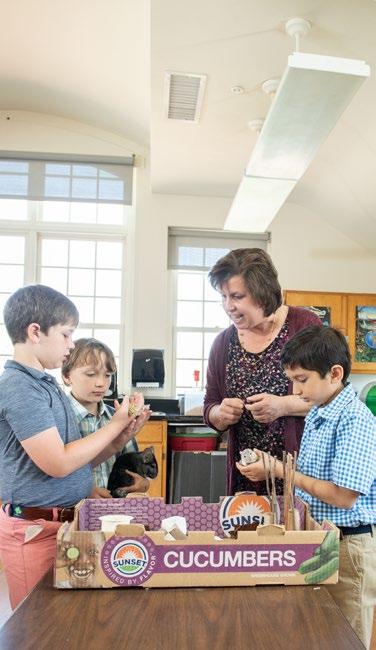
Form I Earth Science
Form I Earth Science allows boys to pursue a greater understanding of their place in the universe through an exploration of topics such as meteorology, oceanography, geology and astronomy. Key science concepts such as heat, density, and buoyancy are integrated into the course, and the boys enjoy hands-on investigations, such as boat-building, water table studies, rock and mineral identification, and bathymetric and topographic map studies, among others. Writing, research, and laboratory skills are emphasized.
Form II Physical Science
In Form II, students employ and improve quantitative and laboratory skills with an in-depth study of Physical Science. The first segment of the course focuses on the structure of the atom and chemical reactions, as part of an introduction to concepts in chemistry. The class’s second segment studies essential concepts in physics, such as velocity, acceleration, Newton’s laws, electricity, and magnetism. Laboratory work emphasizes the use and understanding of technology, with projects including the study of acceleration, gravity, currents, and momentum.
UPPER SCHOOL Lab Courses
SLBio310 – Lab Biology (Forms III and IV)
ONE LAB CREDIT, YEAR COURSE, SEVEN PERIODS OVER A TEN-DAY CYCLE
This course is an introductory study of life science. Cell Biology, Biochemistry, Evolution, survey of kingdoms, Genetics, Human Physiology, and Ecology are the key subjects covered. Numerous handouts and the textbook are utilized as reference material. Class participation is emphasized, and extensive lab experience provides a solid introduction to the study of living things. Students will also be exposed to formal lab report writing as well as be involved with a number of presentations during the course of the year.
SLBio330 – Lab Biology, Honors (Forms III and IV)
ONE LAB CREDIT, YEAR COURSE, SEVEN PERIODS OVER A TEN-DAY CYCLE
Enrollment Criteria: Students will be placed by the Science Department chair. For returning Landon students, eighth grade science, math and English grades, ERB scores and teacher recommendations will be consulted. For students who are new to Landon, admissions testing and science grades will be consulted.
This course is a more technical and rigorous study across the wide field of life science including Cell Biology, Biochemistry, Evolution, survey of kingdoms, Genetics, Human Physiology, and Ecology. The depth and pace of the course is greater and student participation and collaboration are keys to success. Students will look at the interconnectedness of the life science fields and through this, develop an understanding and appreciation of biological systems that they can apply to novel material. Laboratory experience will be more self-directed and will involve both macro and micro biological topics.
26 s cience
SLBio850 – Lab Biology, Advanced (Forms V and VI)
ONE LAB CREDIT, YEAR COURSE, FOURTEEN PERIODS OVER A TEN-DAY CYCLE
Prerequisites: Biology, Chemistry, as well as a minimum grade of 90 in all regularlevel science courses or a minimum grade of 85 in any Honors/AP science courses. Additionally, students must have achieved at least an 85 in all English courses. Teacher recommendations will be taken into account by the Science Department chair when making placement decisions.
The Advanced Biology course is designed to be the equivalent of a college introductory biology course taken by biology majors. The course provides a deeper examination of the basic concepts learned in the Form III Biology course: examining in-depth cellular energetics, molecular biology, gene expression, evolutionary relationships, and biodiversity. Effort will be made to connect these topics to current issues in science and society whenever possible. Emphasis on experimental techniques, inquiry-based laboratory investigations, and discussion-based case analyses allow students to better understand the process of science at the college level.
SLCh400 – Lab Conceptual Chemistry (Forms IV, V and VI)
ONE LAB CREDIT, YEAR COURSE, SEVEN PERIODS OVER A TEN-DAY CYCLE
Prerequisites: Biology. Teacher recommendations as well as science and math grades will be taken into account by the Science Department chair when making placement decisions.
This course is an introduction to the major concepts of Chemistry. The goal of Conceptual Chemistry is to develop an understanding of matter, its composition and structure, and the nature of its behavior. Hands-on experimentation through inquiry and discovery serves to reinforce the principles being learned in class and will lead the students to gain a greater understanding of the material. By understanding the basics of Chemistry, the students will then be better able to analyze a variety of societal issues such as environmental stewardship, energy resources and depletion, genetic engineering, and malnutrition. The long-term goal of the course is to present the students with the skills necessary to acquire technical knowledge to make intelligent decisions for themselves and for the communities to which they belong.
SLCh410 – Lab Chemistry (Forms IV, V and VI)
ONE LAB CREDIT, YEAR COURSE
Prerequisites: Biology. Teacher recommendations as well as science and math grades will be taken into account by the Science Department chair when making placement decisions.
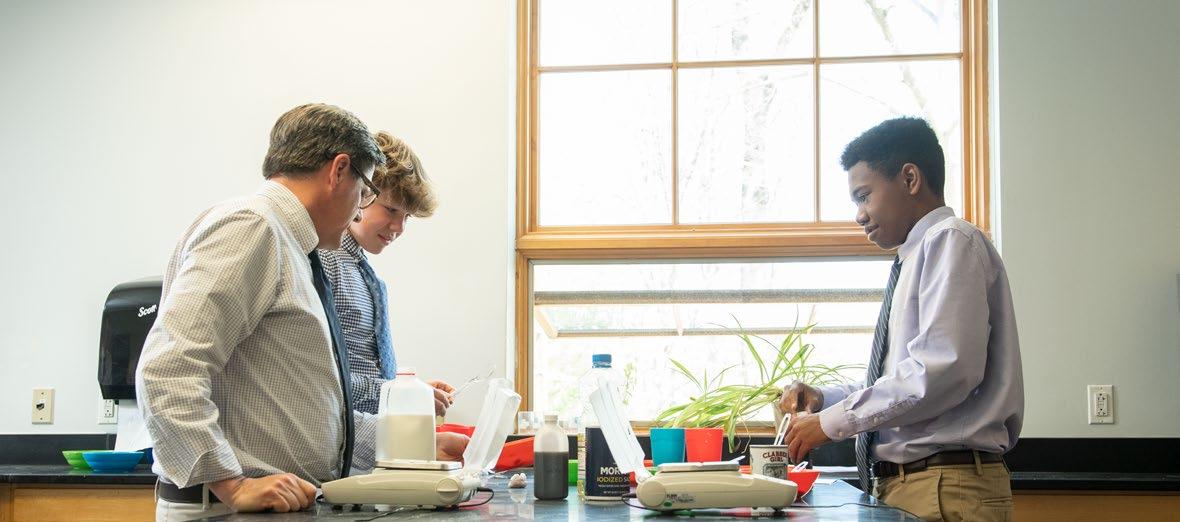
The course is a general survey of the principles of physical, analytical and Inorganic Chemistry. There is special emphasis put on problem-solving and logical thought processes. The mathematics of Chemistry involves algebraic equations with one unknown. The lab emphasis is on studentoriented, inquiry-based work. It is both qualitative and quantitative in nature and involves individual observations and interpretations. This course is strongly recommended for anyone who will be taking science courses in college.
SLCh430 – Lab Chemistry, Honors (Forms IV, V and VI)
ONE LAB CREDIT, YEAR COURSE, SEVEN PERIODS OVER A TEN-DAY CYCLE
Prerequisites: Biology as well as a minimum grade of 90 in all regular-level science/ math courses or a minimum grade of 85 in any Honors science/math courses. Teacher
27 s cience
recommendations will be taken into account by the Science Department chair when making placement decisions.
The course is a general survey of the principles of physical, analytical and Inorganic Chemistry. There is special emphasis put on problem-solving and logical thought processes. The mathematic processes needed for this honors-level class are more rigorous than the regular-level class and involve more complex algebraic equations with one, or sometimes two, unknowns. The lab emphasis is on studentoriented, inquiry-based work. It is both qualitative and quantitative in nature and involves individual observations and interpretations. Students who successfully complete the course will be amply prepared to take the Advanced Lab Chemistry course.
SLCh850 – Lab Chemistry, Advanced (Forms V and VI)
ONE LAB CREDIT, YEAR COURSE, FOURTEEN PERIODS OVER A TEN-DAY CYCLE
Prerequisites: Chemistry, Algebra II, as well as a minimum grade of 90 in all regularlevel science/math courses or a minimum grade of 85 in any Honors/AP science/ math courses. Summer Assignment is recommended and will be assigned in June. Teacher recommendations will be taken into account by the Science Department chair when making placement decisions. This course is designed to approximate the scope, depth, and pace of a college-level, general chemistry course. Major emphasis is placed on chemical calculations and mathematical formulation of chemical principles. Because competent, safe and comprehensive hands-on laboratory technique is the heart of chemical inquiry, this course will continue to develop experience with standard laboratory apparatus and will add experience with computer-based data collection, spectrometry, precise quantitative analysis, and experimental design. The curriculum is geared
towards highly motivated students who have developed the ability to think clearly and express ideas both orally and in writing with clarity and logic. Those students who demonstrate both a strong interest and ability in math and science and are considering science, pre-med, or engineering majors are most appropriate.
SLES530 – Lab Environmental Science, Honors (Forms V and VI)
ONE LAB CREDIT, YEAR COURSE, SEVEN PERIODS OVER A TEN-DAY CYCLE
Enrollment Criteria: At least an 85 in all regular-level science courses or at least an 80 in any Honors/Advanced science courses. Additionally, students must have achieved at least an 85 in all English courses. Teacher recommendations will be taken into account by the Science Department chair when making placement decisions.
The goal of this course is to provide students with the scientific principles, concepts, and methodologies required to understand the interrelationships of the natural world, to identify and analyze environmental problems both natural and human-made, to evaluate the relative risks associated with these problems, and to examine alternative solutions for resolving or preventing them. Field work, field trips, labs, and other hands-on activities will be a part of the curriculum.
SLES850 – Lab Environmental Science, Advanced (Forms V and VI)
ONE LAB CREDIT, YEAR COURSE, FOURTEEN PERIODS OVER A TEN-DAY CYCLE
Prerequisites: Biology, Chemistry, as well as a minimum grade of 90 in all regular-level science/math courses or a minimum grade of 85 in any Honors/Advanced science/math courses. Additionally, students must have achieved at least an 85 in all English courses. Teacher recommendations will be taken into account by the Science Department chair when making placement decisions.
The Advanced Environmental Science course is designed to be the equivalent of a college introductory Environmental Science course taken by majors in this field. The course provides an opportunity to look at some current issues in the Environmental Science field applying many of the concepts learned in other science and math classes. Many of those concepts as well as those in Environmental Science will form the basis of a deeper examination of those issues, as well as opportunities to collaborate with outside organizations. Some of the issues we will explore next year include penguins and krill in the Southern Ocean, Bluefin Tuna, seafood and fisheries in general, as well as exploring farming practices, anthropogenic impacts on forests, and breaking down and rebuilding our carbon footprint. Emphasis on experimental techniques, inquirybased laboratory investigations, and discussion-based case analyses allow students to better understand the process of science at the college level.
SLFS510 – Lab Forensic Science (Forms V and VI)
ONE LAB CREDIT, YEAR COURSE, SEVEN PERIODS OVER A TEN-DAY CYCLE
Prerequisites: Biology, Chemistry.
Students learn and apply the scientific method to the study of criminal investigation and law in this course. Interdisciplinary study is employed using biological, chemical, and physical concepts. Topics include crime scene procedure, hair and fiber analysis, questioned documents, forensic pathology and entomology, fingerprints and impressions, serology and blood spatter, DNA, drugs and toxicology, ballistics, and the legal aspects of forensic science. This course utilizes handouts, a textbook, and supplemental reading materials. Emphasis is placed on collaborative projects, critical thinking
28 s cience
and analytical skills, and in-depth, inquiry-based laboratories. The course culminates with students processing a large-scale, simulated crime scene.
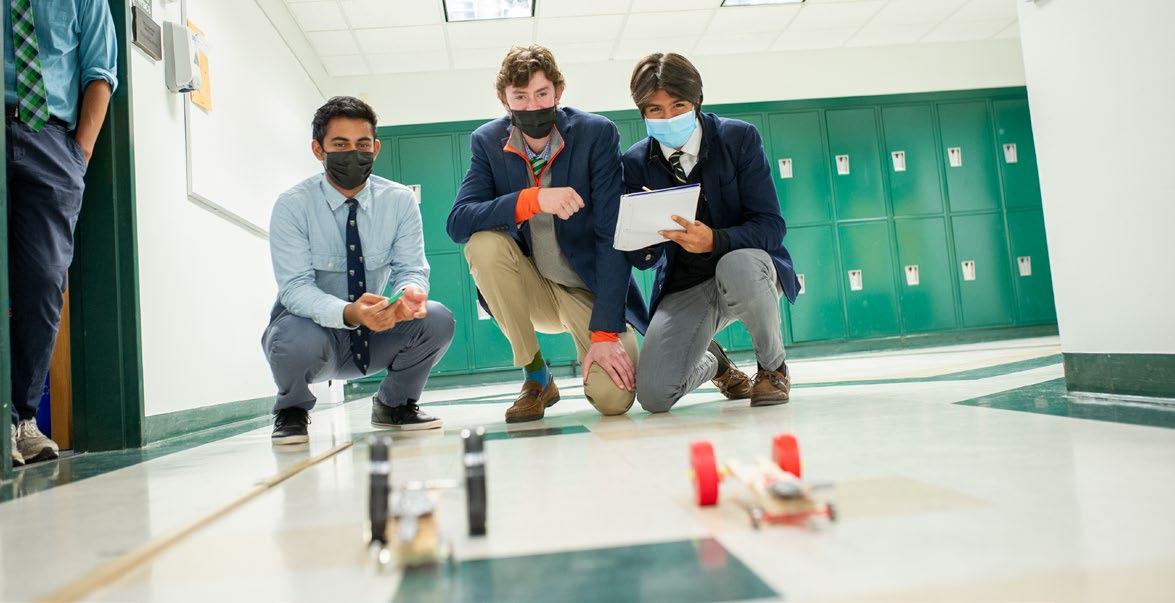
SLPh510 – Lab Physics (Forms V and VI)
ONE LAB CREDIT, YEAR COURSE, SEVEN PERIODS OVER A TEN-DAY CYCLE
Prerequisites: Algebra II, Geometry. Teacher recommendations will be taken into account by the Science Department chair when making placement decisions.
This course is an algebraic- and trigonometric-driven survey of classical and modern physics. Topics include kinematics and dynamics (in two dimensions), thermodynamics, wave phenomena (including sound), optics, electricity and magnetism, and atomic and quantum physics. An understanding of fundamental concepts is paired with problem-solving and hands-on laboratory experience. Evaluations include tests, worksheets, student presentations, and laboratory reports.
SLPh530 – Lab Physics with Algebra, Honors (Forms V and VI)
ONE LAB CREDIT, YEAR COURSE, SEVEN PERIODS OVER A TEN-DAY CYCLE
Prerequisites: A minimum grade of 90 in all regular-level science/math courses or a minimum grade of 85 in any Honors/AP/ Advanced science/math courses. Co-requisite: Advanced or Turbo Pre-Calculus. Teacher recommendations will be taken into account by the Science Department chair when making placement decisions.
An algebra-based course equivalent to a semester-long algebra-based college physics course. The first semester of the course covers Newtonian mechanics (including linear and rotational motion), linear and angular momentum, work, energy, and power. The second semester covers simple harmonic motion, mechanical waves, sound, electrostatics, electrical energy and DC circuits. Conceptual understanding with a rigorous problem-solving component will be paired with a significant hands-on, inquiry-based laboratory component.
SLPh850 – Lab Physics with Calculus, Advanced (Forms V and VI)
ONE LAB CREDIT, YEAR COURSE, FOURTEEN PERIODS OVER A TEN-DAY CYCLE
Prerequisites: A minimum grade of 90 in all regular-level science/math courses or a minimum grade of 85 in any Honors/AP science/math courses. A Summer Assignment is required and will be assigned in June. Co-requisite: Advanced Calculus with Synthesis strongly recommended. Teacher recommendations will be taken into account by the Science Department chair when making placement decisions.
Lab Physics with Calculus is a rigorous, calculus-driven physics course comparable to those offered to first-year science majors at selective colleges and universities. The first semester focuses on classical mechanics, which includes kinematics, dynamics (including linear, circular, and rotational systems), energy in all of its forms and its conservation, and the simple harmonic oscillator. The calculus concepts of the derivative and the definite integral are introduced and used where appropriate. The second semester focuses on the development
29 s cience
of Maxwell’s equations in their integral form and their applications, including DC circuits. The course includes a significant laboratory component.
SLIE510 – Introduction to Engineering (Forms V and VI)
ONE LAB CREDIT, YEAR COURSE, SEVEN PERIODS OVER A TEN-DAY CYCLE
Prerequisites: A minimum grade of 85 or higher in both Algebra II and Geometry courses. Teacher recommendations will be taken into account by the Science Department chair when making placement decisions.
Introduction to Engineering in an algebra-based course provides a rigorous and extensive introduction to the common principles and methodologies found in the various branches of engineering. The course focuses on the fields of mechanical and civil engineering, electrical engineering, computer-based engineering, and robotics. It includes significant projectbased and design-process components that will focus on hands-on assignments and real-world applications that are designed to incorporate the various fields of engineering. Concepts and mathematical procedures related to force, motion and energy will be used, so students must be comfortable with algebra, geometry, and trigonometry. Students will be provided with the basic knowledge and analytical skills needed
to develop and create a meaningful and practical design, emphasize global concerns and priorities in engineering, and integrate understanding of the ethical, cultural, and societal issues related to engineering practices.
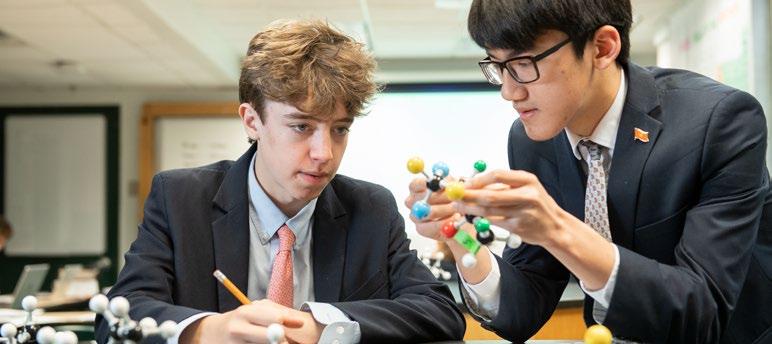
Non-Lab Courses
SES510 – Environmental Science (Forms IV, V, and VI)
ONE NON-LAB CREDIT, YEAR COURSE, SEVEN PERIODS OVER A TEN-DAY CYCLE
Earth and Environmental Studies is a survey-based interdisciplinary course. The course will cover the core earth science subjects of Ecology, Geology, Hydrology, and Meteorology, as well as examine the Environmental Science subjects of land use and planning, human population, energy, waste and pollution, and climate change. The course will strive to help students build a stronger connection to the natural world and inspire in them the ability to create positive change in the world. It will also cover the complexity of local and global environmental issues and include hands-on activities and field work.
SMet511 – Meteorology (Forms IV, V, and VI)
FALL SEMESTER, ½ NON-LAB CREDIT, SEVEN PERIODS OVER A TEN-DAY CYCLE
This is an observationally oriented class with a special emphasis on data collection and analysis, daily discussions about the current weather, and shortterm forecasts. Extensive use will be made of the Internet and Landon’s real-time weather station. Students will learn how to integrate images and text as they create a cloud chart.
SOrn512 – Ornithology (Forms IV, V, and VI)
SPRING SEMESTER, ½ NON-LAB CREDIT, SEVEN PERIODS OVER A TEN-DAY CYCLE
Ornithology will build a foundation of knowledge about birds to both inspire lifelong learning and interest for birds as well as a stronger connection with the natural world. Course content will include a history and evolution of birds, flight and feathers, anatomy and physiology, ecology, and behavior. Special emphasis will also be placed on spring migration and reproduction including mating, breeding, and nesting. The course will incorporate regular field work on campus and developing field skills. Extensive use of smartphone apps including Merlin and eBird will be used to identify and track data of sightings from the field.
30 s cience
STUDIO ARTS
Mission: The Landon Studio Arts Department provides young men with a diverse experience in the visual arts. Culture, technology, and process are major components embedded into a rich curriculum providing students with the opportunity to explore the many mediums within the studio arts.
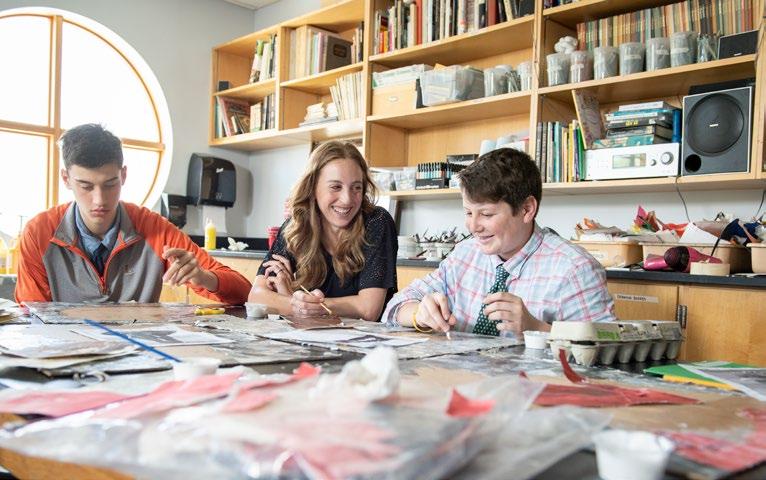
Vision: Landon’s Studio Arts Department dedicates itself to the ethical, intellectual, physical and social development of boys through the visual arts. A diverse arts education helps each student develop fundamental skills while fostering curiosity and stimulating aesthetic understanding as they work under the guidance of a practicing artist and educator. Students have the art world brought to their classrooms, from past classics to the avant garde. Field trips to the National Gallery and other painting occasions are built into the curriculum annually.
We believe:
• Respect for self, others and one another’s work is the cornerstone to growth and learning.
• A safe and emotionally comfortable environment promotes student learning.
• Students can learn to analyze, synthesize and evaluate to solve problems in a changing world.
• Student learning is enhanced by cross-disciplinary experiences.
• Students have talent requiring cultivation and refinement.
• Students learn and process in different ways.
• Students demonstrate their learning through various forms of assessment.
• Challenging expectations and hard work promote intellectual and aesthetic excellence.
• Students flourish in a creative and supportive community.
• Students embrace diversity to better understand themselves and others.
• Engaging and rigorous instruction prepares students for future education and career roles.
• Educational opportunities extend beyond the classroom.
• Partnerships between students and professional communities enhance student learning.
• Discussion, performance and critique are valuable tools for understanding and growth.
LOWER SCHOOL
Through an introduction to the elements of creative design-lines, shapes, tones, textures, and colors, students develop powers of observations, sensitivity and imagination. The care and control of drawing, painting and craft materials are stressed. Students work in tempera, watercolor, pastels, ceramics, copper, fabric, papier-maché, and graphic arts. They are expected to complete projects, follow and accomplish the requirements, have knowledge of the principles of visual design, and be able to relate their projects to other artists, art movements, and cultures.
31 s tudio a rts
MIDDLE SCHOOL
Grade 6 Studio Art
Grade 6 Art uses age-appropriate materials to expose students to the major concepts in drawing, painting, and design. Projects introduce and use a variety of media, such as graphite, paint, and oil pastels, for example. Art faculty take care to align their instruction with previous art courses to increase a student’s confidence in class. The course includes elements of observational drawing as well as abstract expression. As assignments are introduced, they are given context by discussion of art history and notable/influential artists to provide broad exposure to appreciate art from many cultures.
Form I Studio Art
Form I Art focuses on developing a diverse skill set within the art studio. Using familiar media, students are exposed to unconventional techniques, such as dot painting in the style of the indigenous peoples of Australia. Design elements, such as balance, symmetry, and simplification of form, are also explored in order to learn more about composition. Projects are longer than previous years, with an emphasis on student organization and independence.
Form II Studio Art
In Form II Art, students tackle complicated, multi-step projects designed to encourage problem solving, independence, and personal expression within the art studio. Focusing on mastering foundations of drawing, painting, and design, students are encouraged to complete final works of professional standards. Assignments are inspired from classical and recent artists alike, from Renaissance and Impressionist painters to current street artists, and are completed using both conventional and unusual materials. Previous projects have included wooden Maori tikis, impressionist animal paintings, and geometric painted hubcaps. Successful completion of the course prepares students for Upper School art classes while also fostering an appreciation for the fine arts beyond Landon.
studio maintenance are also covered to help a student produce finished pieces with quality craftsmanship.
AIDA1/AIDA2 – Digital Art (Forms III, IV, V, and VI)
This course offers students the opportunity to learn the fundamentals of both digital photography and graphic design. Students use DSLR cameras and computer design software to create digital artwork with a focus on the principles of design for creating both compelling photographs and engaging graphic design projects. DSLR Cameras and access to editing and design software are provided.
AID1/AID2 – Drawing (Forms III, IV, V, and VI)
UPPER SCHOOL Studio Art Courses
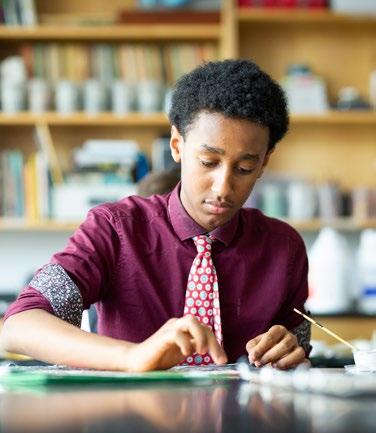
½ CREDIT, SEMESTER COURSE, SEVEN PERIODS OVER A TEN-DAY CYCLE
A studio art core course can be repeated for credit. Students who repeat will be identified as an advanced studio art student with the recommendation of their art instructor for the repeated course Please note: Drawing must be completed within the first year of the Studio Art experience in the Upper School.
Offerings include:
AICer1/AICer2 – Ceramics
(Forms III, IV, V, and VI)
This course provides students with a working understanding and practice in a variety of ceramic construction and finishing techniques. Students will learn both hand-building skills and wheelthrowing (potter’s wheel) techniques to create pieces with a focus on form and functionality. Glazing, kiln firing, and
A foundation course designed to facilitate and improve one’s approach to representational drawing. Special emphasis is placed on the recognition and ordering of basic visual relationships in still life, landscape, architectural, and figure motifs, and on the practice of drawing as visual reasoning. As students begin to gain control of formal visual elements and progress to the advanced level, a wider range of subject matter and concepts is introduced.
AIP1/AIP2 – Painting (Forms III, IV, V, and VI)
This course introduces traditional and contemporary approaches of oil painting through technical application and conceptual ideologies. The development of technique through physical paint application as well as experimentation will be explored. Content and meaning are examined through observation and interpretation to acknowledge personal meaning and expression. Providing a strong foundation to the basics of oil painting, students will gain a familiarity and comfortability with material, process, and language of painting.
32 s tudio a rts
Students are encouraged to create individualized applications of media to communicate their ideas through wellcrafted paintings.
ASc1/ASc2 – Sculpture (Forms III, IV, V, and VI)
A course designed to explore the fundamental concepts and methods to create forms in three dimensions. Additive, subtractive, and casting concepts are approached using clay, plaster, wire, wood, metal, and fiber. Sculpture students are given assigned problems structured to study form in nature and the scale and installation of artwork by sculptors across cultures.
Students employ basic elements of sculpture such as shape, form, mass, volume, positive/negative space, and texture to create artwork using the symbolism and significance of materials.
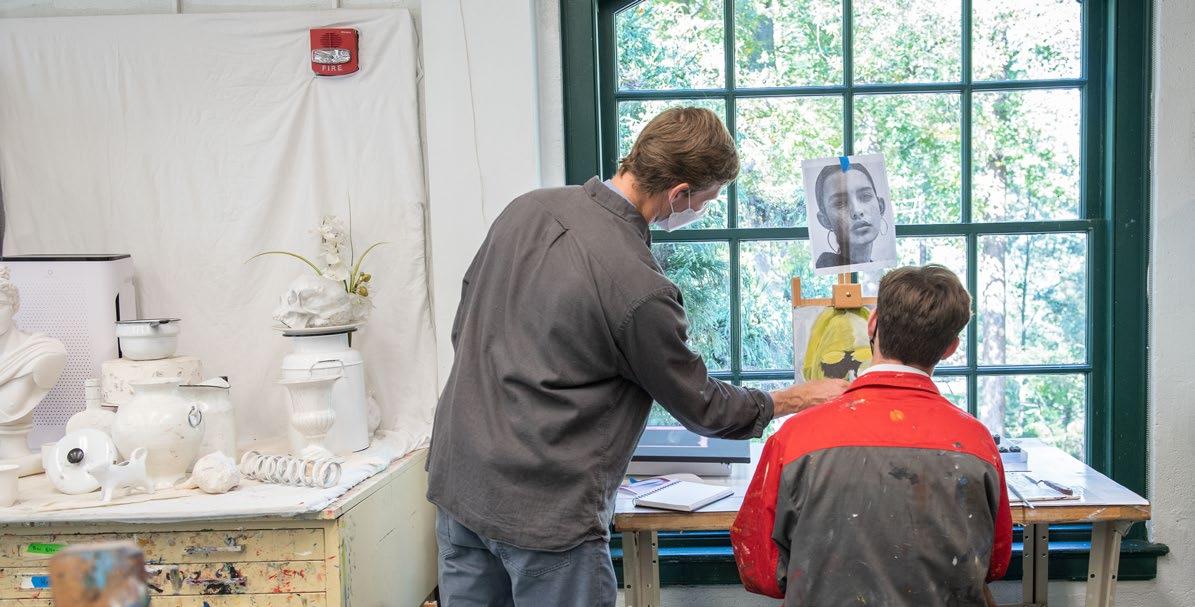
AIA1/AIA2 – Architecture (Forms III, IV, V, and VI)
Prerequisites: Drawing.
This course introduces students to world architecture and urbanism from prehistory to the current era, as well as developing and honing the main visualizing skill of the architect: drawing. The course helps students understand the various cultural, technological, philosophical, and aesthetic ideas that have helped shape buildings through history. Students are expected to learn and understand fully the concepts and material presented in class and exhibit an ability to interpret data meaningfully and independently in projects and assignments.
Studio Art Elective Course
This course meets less than six days of the eight-day cycle and does not receive credit as a core art course. This year’s offering is:
APJ0.5 – Photojournalism, Introduction to (Forms III, IV, V, and VI)
½ CREDIT, YEAR COURSE, THREE PERIODS OVER AN EIGHT-DAY CYCLE
Prerequisites: Freshmen with teacher approval only. This is a half-credit art elective and does not qualify as a core art credit that counts towards graduation requirements.
Note: Course credit does NOT count towards meeting a student’s Studio Arts graduation requirement
This is an introductory course in journalistic writing, editing, design, and photography. Students learn the skills to produce an informative, visually stimulating and professional-quality print publication. The goal of this class is to produce Landon’s Brown and White yearbook. Instruction in Adobe InDesign and Adobe Photoshop is a key part of the course. No prior knowledge required.
33 s tudio a rts
WORLD LANGUAGES
The Landon School World Languages Department teaches the disciplines of Chinese, French, Latin, and Spanish.

Our mission is to prepare the boys so that by the conclusion of their formal study they will have achieved the following goals:
• Meet and exceed the equivalent of an intermediate to intermediate-high level of proficiency, as defined by the American Council on the Teaching of Foreign Languages (ACTFL).
• Understand thoroughly and appreciate the structure of the language studied.
• Broaden and enrich their ability to communicate effectively.
• Become more aware of the world in which they live.
Proficiency in a modern language will prepare students to go anywhere in the world where the language is spoken and be able to meaningfully communicate with the people who speak the language that they have studied. Proficiency in Latin means that students will be able to read and write Latin at a sophisticated level. This proficiency will enable them to read and analyze the works of the significant figures in the classic world defined by the breadth of the Roman epoch and its influence on Western civilization.
By understanding thoroughly and appreciating the structure of the language studied, the students will have a complete knowledge of the elements of the language and the way they function; the logic of
the grammar and the word order; and the subtleties of the differences in diction.
By broadening and enriching communication abilities, students will benefit from the experience of appreciating in greater depth a concept expressed in a language other than English; become aware of cultural nuances and values reflected in the use of the language studied; become acutely aware of the details in managing the skills of communication while using the language studied; and apply the knowledge gained in studying a world language to express themselves in English more efficiently and effectively.
By becoming more aware of the world in which they live, students will ultimately gain an appreciation for the cultures in which the target language is or was spoken; widen the lenses through which they perceive the human experience, both present and past; and celebrate the diversity of the world in which we live, both at home and abroad.
LOWER SCHOOL
Learning a new language is fun and exciting. Repetition with lots of practice in the classroom and at home is the key to learning a new language. Students listen and repeat words and expressions, sing songs, play games, and create and present projects to reinforce what they study in class. Also, they hear, read, write, tell, and re-tell stories through a variety of Total Physical Response classroom activities.
Students in Grade 3 Spanish meet twice a week. The course features different themes such as the Spanish alphabet, pronunciation, greetings and goodbyes, classroom commands and school materials, numbers 0-31, colors, family members, the parts of the body, basic foods, weather, and clothing. Students hear and read the story of El ratón Pablito, and they create their own comic book about the story. The vocabulary and phrases learned are repeated throughout the year and incorporated in student projects and presentations. As a final project,
34 World l an G ua G es
students team up to create a game board to review the year’s lesson, and their peers all engage by playing the games.
Students in Grade 4 Spanish meet twice a week. A wide range of themes is taught and reinforced through projects and presentations. Some topics that Grade 4 focuses on are describing one’s family, asking and answering basic questions, talking about the weather, learning about cultures of Spanish-speaking countries, talking about and sampling foods from the various countries, and participating in a pen-pal program with a Lower School in Valladolid, Spain. In pairs and individually, students create games, posters, PowerPoint presentations, projects, stories, and comics to review the themes that are taught.
Students in Grade 5 meet three times a week. The students start the year by exchanging information with their pen-pal partners from Spain. At the end of the pen-pal project, students send and receive a video from their pen-pal partner. The classes from Landon and Spain also exchange care packages with cultural aspects of their respective countries/regions. Through a variety of projects, presentations, and activities, students are actively engaged and challenged to listen, read, write, and speak Spanish throughout the year.
Grade 5 students also have the opportunity to collaborate with the Middle School Spanish classes. Their older peers share information about influential Afro-Latinos, and the Grade 5 students have the opportunity to ask fundamental questions in Spanish. Then the younger boys create fictional stories that they present to the Middle School Spanish classes. Towards the end of the year, students interview “the special person of the day,” reinforcing the themes and topics studied throughout the year. Students also engage in a classwide daily routine project and survey.
MIDDLE SCHOOL
Grade 6 – Chinese, French, Latin, and Spanish
World Language is a requirement for all Grade 6 students, and boys have the opportunity to choose which language to study. There is increased exposure to language through listening, speaking, and writing. Focus remains on honing aural skills, acquiring vocabulary, and developing accurate use of the language in simple situations.
Form I World Languages –Chinese, French, Latin, and Spanish
Form I classes continue to emphasize pronunciation, the fundamentals of grammar, reading, writing, speaking, and listening comprehension. The classes also widen the base of vocabulary upon which future courses in the language depend. The cultures of the countries where the language is spoken are considered, as are the achievements and customs of its peoples.
Form II World Languages –Chinese, French, Latin, and Spanish
Students entering Form II have already undertaken significant instruction in a world language; accordingly, the grade’s courses offer a continuation of the program with increasing emphasis on reading, more complex grammatical constructions, deeper vocabulary, and free oral expression. The Chinese, French, and Spanish classes are conducted largely in the language studied, and students are expected to communicate in that language. Students in our active Latin program continue to read, write, and speak in an increasingly immersive environment.
Note for students new to language study when entering Form I or Form II:
Students new to Landon’s Form I or Form II who have no previous experience in language will take Foundations in Spanish. Foundations in Spanish is a course designed for completely new language learners as well as those who have already possess some familiarity with Spanish. Students will learn how to talk about themselves and their family, the classroom environment, their academic pursuits, and their pastimes. Emphasis is on vocabulary acquisition and retention, pronunciation, comprehension of basic, authentic spoken Spanish, and the use of foundational sentence structures to speak and write. New Form I or Form II students who have begun studying Spanish can take Integrations in Spanish a course that continues to support and challenge beginning learners of Spanish. Students will learn words and expressions related to travel opportunities, shopping, dining, and celebrations. In this course, students will integrate new grammar structures into an ever-expanding vocabulary base. Additionally, the duration and complexity of speech selections that they hear will increase, and students will produce more complex speech and writing samples.
Heritage/Native Speaker Policy
IntheMiddleSchool,heritageornative speakersofSpanish,French,orChinesemay notenrollinthosecourses.Itisexpectedthat aheritageornativespeakerwillstudya languagethathehasnotyetlearned.
35 World l an G ua G es
UPPER SCHOOL Chinese
LC310 – Chinese III
ONE CREDIT, YEAR COURSE, SEVEN PERIODS OVER A TEN-DAY CYCLE
The course emphasizes the gradual building of aural, oral, and characterwriting skills. Students not only expand the vocabulary bank and new grammatical structures in each lesson, but also develop listening, speaking, reading, and writing skills throughout the year. Students also study Chinese culture related to each chapter of the text.
LC410 – Chinese IV
ONE CREDIT, YEAR COURSE, SEVEN PERIODS OVER A TEN-DAY CYCLE
This course begins with a thorough review of the grammatical constructions and vocabulary studied in Chinese III. The units covered in the course continue to enhance the students’ knowledge of fundamental vocabulary and present increasingly complex grammar. There is
also an emphasis on reading, speaking, and character-writing skills. Chinese culture related to each chapter of the text is woven into many aspects of the course.
LC510 – Chinese V
ONE CREDIT, YEAR COURSE, SEVEN PERIODS OVER A TEN-DAY CYCLE
This course offers Chinese language instruction at an advanced level. The course is conducted in Chinese. It aims to provide a solid foundation in grammar and expand the students’ ability to handle everyday situations and tasks in Chinese. Students will be asked to write short essays. Oral, aural, reading, and writing skills will be emphasized through reading intermediate-level materials in Chinese.
LC630 – Senior Chinese, Honors
ONE CREDIT, YEAR COURSE, SEVEN PERIODS OVER A TEN-DAY CYCLE
The goals of this course include the achievement of a solid, intermediatelevel competence in three communicative modes in Chinese:

interpersonal, interpretive, and presentational. The course is taught primarily in Chinese. Students are expected to write short essays and make formal oral presentations in class frequently. They are also exposed to the formats of the AP exam and trained in trained in aural, oral, and written exercises. The course also emphasizes the different aspects of the Chinese culture and traditions.
French
LF210 – Upper School French
ONE CREDIT, YEAR COURSE, SEVEN PERIODS OVER A TEN-DAY CYCLE
This is an accelerated introduction to French designed to prepare students for French III the following year. It will be open to students who are new to French or to those boys with limited exposure to the language. Further, this class may also serve as a bridge year for Landon Middle School students entering the Upper School. The course will expose students to all of the
36 World l an G ua G es
foundational elements of the language, focusing on verb conjugations, sentence structure, and new vocabulary. At the end of the course, students will be expected to use the present, past, and future tenses both in written and oral expression. A variety of personal vocabulary will also be introduced to enable students to express themselves coherently when discussing their daily lives. Short readings, as well as listening material, will be a part of the daily routine, as students will be expected to develop all areas of their expression and understanding of the language.
LF310 – French III
ONE CREDIT, YEAR COURSE, SEVEN PERIODS OVER A TEN-DAY CYCLE
Class is conducted primarily in French, and students are required to speak mostly French. This course will continue the study of French emphasizing the expansion of vocabulary and the acquisition of more complex grammatical structures. Students will have access to authentic French through the use of a variety of multimedia sources including short stories, newspaper and magazine articles, music, films, and podcasts. Oral and written proficiency will be the focus of this class as students will be required to use the language in a wide variety of familiar situations.
LF330 – French III, Honors
ONE CREDIT, YEAR COURSE, SEVEN PERIODS OVER A TEN-DAY CYCLE
Prerequisites: Final grade in French II of 88% and teacher recommendation; or, a Landonadministered French placement test result.
Class is conducted almost exclusively in French, and students are required to speak mostly French. This Honors course exposes students to the same material and methods used in French III, but the pace of the course is faster and the study more intensive. This course is intended to give the students
greater facility in all aspects of the language: written, oral expression listening comprehension, and reading.
LF410 – French IV
ONE CREDIT, YEAR COURSE, SEVEN PERIODS OVER A TEN-DAY CYCLE
French IV is primarily a conversation course in which students regularly practice handling practical situations that they would confront if living, studying or traveling in a Frenchspeaking country. Through themebased, real-life situations, students expand and perfect their knowledge of grammar and vocabulary, as well as their comprehension and pronunciation by actively participating in discussions, role-plays, impromptu presentations, and exposés. As mastering a language means heightening one’s awareness of cultural differences, students also study, discuss and even interpret short literary works, songs, television shows, advertisements/commercials, films, and articles of the Frenchspeaking world. The course is aimed at developing confidence in stretching language abilities so that, through taking language risks, students maximize their communicative ability.
LF430 – French IV, Honors
ONE CREDIT, YEAR COURSE, SEVEN PERIODS OVER A TEN-DAY CYCLE
Prerequisites: Final grade of 90% (or a rawi.e., unweighted – grade of 85%) in French III Honors and teacher recommendation.
French IV (H) is primarily a conversation course in which students regularly practice handling practical situations that they would confront if living, studying or traveling in a Frenchspeaking country. Through themebased, real-life situations, students expand and perfect their knowledge of grammar and vocabulary, as well as their comprehension and pronunciation by actively participating in discussions, role-plays, impromptu presentations and
exposés. As mastering a language means heightening one’s awareness of cultural differences, students also study, discuss and even interpret short literary works, songs, television shows, advertisements, commercials, films, and articles of the French-speaking world. They should be able to create long, coherent paragraphs and dialogues using vocabulary and grammar they have studied. Students should be able to understand an oral dialogue or narrative in any tense and with some complex structure. They should be able to read and understand an authentic text with limited use of complex structures.
LF510 – French V
ONE CREDIT, YEAR COURSE, SEVEN PERIODS OVER A TEN-DAY CYCLE
This advanced course is taught exclusively in French and is designed to allow a student to reach a high level of proficiency in both oral and written French. Students study and enhance their appreciation for Francophone culture through various media. Complete works of Francophone literature are read and studied. Creative writing, as well as literary criticism, are taught and practiced. Oral presentations in French help provide students with life skills to communicate at ease in all Francophone countries.
LF530 – French V, Honors
ONE CREDIT, YEAR COURSE, SEVEN PERIODS OVER A TEN-DAY CYCLE
Prerequisites: Final grade of 90% (or a rawi.e., unweighted – grade of 85%) in French IV Honors and teacher recommendation.
This advanced course is taught exclusively in French and is designed to allow a student to reach a high level of proficiency in both oral and written French. Students study and enhance their appreciation for Francophone culture through various media. Complete works of Francophone literature are read and studied. Creative
37 World l an G ua G es
writing, as well as literary criticism, are taught and practiced. Oral presentations in French help provide students with life skills to communicate at ease in all Francophone countries. By the end of the year, they should be ready to read various works of advanced literature. They should be able to write essays using a variety of grammatical structures and consistent tenses. The content of all oral and written material to which the students are exposed is selected to encourage an appreciation of cultural similarities and differences. Then design and execution of the course as a whole should kindle the students’ enthusiasm for further study of the French language and culture.
LF630 – Senior French, Honors
ONE CREDIT, YEAR COURSE, SEVEN PERIODS OVER A TEN-DAY CYCLE
Prerequisites: Final grade of 90% (or a rawi.e., unweighted – grade of 85%) in French V Honors and teacher recommendation.
Class is taught solely in French, and the students are required to speak only French in class. The first trimester will be spent exploring the Francophone world through the window of the news. Students will watch and listen to news broadcasts from a variety of Francophone countries, seeing current events as they happen from different perspectives. Further, the students will listen to a book on tape which will take them through Paris and eventually down to the south of France. Frequent oral presentations will give the students ample opportunity to hone their speaking skills. Likewise, we will introduce a second book on tape during the second semester which begins in Paris but quickly takes the students to Switzerland. The Francophone world that has been emphasized from the beginning of the Upper School curriculum will now come to life. A unit on Impressionist art will conclude our senior’s French experience at Landon.
Latin
LL210 – Upper School Latin
ONE CREDIT, YEAR COURSE, SEVEN PERIODS OVER A TEN-DAY CYCLE
This course is offered to students entering the Upper School with little or no experience in Latin. It emphasizes the beginning elements of grammar, reading, and writing, and establishes a base of vocabulary upon which future courses in the language depend. Students study basic vocabulary, grammar, and syntax, and then progress to more advanced concepts. Grammar topics for this course include noun morphology, verb tenses, noun-adjective agreement, pronouns, and basic Latin syntax. In addition, students explore Greco-Roman civilization through a series of readings, both in English and Latin.
LL310/LL330 – Latin III & Latin III, Honors
ONE CREDIT, YEAR COURSE, SEVEN PERIODS OVER A TEN-DAY CYCLE
This course continues the study of Latin beyond the intermediate level, beginning with a review of all Latin grammar. Active, conversational Latin, and Latin composition are emphasized as a continuation of our Middle School curriculum. Honors students at this level spend less time on review and focus instead on translation fluency and advanced grammar concepts. Students transition from the grammar- centric work of the Cambridge and Wheelock’s Latin texts to the translation and analysis of original Latin literature.
LL410/LL430 – Latin IV & Latin IV, Honors
ONE CREDIT, YEAR COURSE, SEVEN PERIODS OVER A TEN-DAY CYCLE
In this course, students build on the knowledge of grammar, vocabulary, and culture that they gained from the Cambridge and Wheelock’s Latin series
and apply it to lengthier, original Latin texts. Through the study of these works, students become familiar with poetic and rhetorical devices, text in meter, and mythology. Honors students focus on developing their critical thinking skills and argumentative essay writing, both of which are important for their progress in the Latin program. Assignments include papers and projects about cultural and literary aspects of classical Rome. Original texts studied in this course include works by Ovid, Catullus, Caesar, Cicero, Vergil, and Apuleius.
LL510/LL530 – Latin V & Latin V, Honors
ONE CREDIT, YEAR COURSE, SEVEN PERIODS OVER A TEN-DAY CYCLE
This is a fast-paced, advanced course that focuses on the reading and analysis of Latin poetry, with a particular emphasis on Vergil’s Aeneid. The first three marking periods are devoted to the intensive study of this epic poem. Students will focus on translation fluency, sight reading, analytical writing, literary devices, and metrical reading. The fourth marking period will feature selections from the works of Catullus, Horace, and Ovid as students explore other thematic and metrical aspects of Latin poetry.
LL630 – Senior Latin, Honors
Prerequisites: Completion of Latin V Honors.
This multi-faceted, honors-level Latin course is designed to harness the strong Latin language skills of students who have completed Latin V Honors. Whereas traditional advanced Latin courses focus on translation and analysis, the aim of this course is to develop reading, speaking, listening, and composition skills by way of various methods, including conversational Latin components and composition based on the writing styles of Caesar, Cicero, and other authors of the classical age.
38 World l an G ua G es
Students will “activate” their knowledge of Latin through dialogues, writing about their experiences, presentations, and critical analysis, all in Latin.
Spanish
LS200 – Spanish I
ONE CREDIT, YEAR COURSE, SEVEN PERIODS OVER A TEN-DAY CYCLE
Students entering the Upper School with little or no experience in Spanish take this course. It introduces pronunciation, emphasizes the beginning elements of grammar, reading, writing, speaking, and listening comprehension, and establishes a base of vocabulary upon which future courses in the language depend.
LS210 – Spanish II
ONE CREDIT, YEAR COURSE, SEVEN PERIODS OVER A TEN-DAY CYCLE
This course is a continuation of the program with increasing emphasis on reading, vocabulary development, and free oral expression. The grammar presented in first-year Spanish is reviewed, and all remaining major structures are introduced, including the future tense, the conditional tense, the compound tenses, and the subjunctive mood. Hispanic culture, presented in short readings in Spanish, is woven into many aspects of the course.
LS310 – Spanish III
ONE CREDIT, YEAR COURSE, SEVEN PERIODS OVER A TEN-DAY CYCLE
The course is designed to strengthen students’ command of spoken and written Spanish. Special emphasis is placed on discussing present, past, and future events. Students also strengthen their ability to express feelings, opinions, and assumptions by using the subjunctive and conditional constructions. Along with the mastery of grammar and the development of
vocabulary, considerable attention is given to the development of reading skills and presentational speaking skills through a number of creative and research-based projects.
LS330 – Spanish III, Honors
ONE CREDIT, YEAR COURSE, SEVEN PERIODS OVER A TEN-DAY CYCLE
Prerequisites: Final grade of 88% in Upper School or Middle School Spanish II and teacher recommendation, or Landonadministered Spanish placement test result.
This course reviews all elements of grammar as well as delve more deeply into previously learned ones, emphasizing the development of sustained speech in Spanish, highlydiscerning aural comprehension, close reading skills, and expressive and precise writing. The course centers on level-appropriate Comprehensible Input (CI) novels, core cultural competencies, historical perspectives, and original presentations on a variety of topics.
LS410 – Spanish IV
ONE CREDIT, YEAR COURSE, SEVEN PERIODS OVER A TEN-DAY CYCLE
Continuing the approach followed through Level III, this course reviews and reinforces all of the grammar previously studied and requires the student to use it to communicate effectively in Spanish. The course focuses primary attention on the four linguistic skills of reading, writing, speaking, and listening, and emphasizes the concurrent utilization of all tenses and moods. Making use of culturally relevant literature, the course has the goal of strengthening both the student’s language skills and the student’s cultural awareness.
LS430 – Spanish IV, Honors
ONE CREDIT, YEAR COURSE, SEVEN PERIODS OVER A TEN-DAY CYCLE
Prerequisites: Final grade of 88% in Spanish III Honors and teacher recommendation; or, 90% in US Spanish III, teacher recommendation, and a successfully completed (i.e., 90%) summer work packet; or, a Landon-administered Spanish placement test result.
This course reinforces the previously studied grammar and syntax while emphasizing the effective application of all the linguistic skills to promote high-level communication. The course employs a variety of literature and media to promote precise and increasingly sophisticated writing, as well as extemporaneous speaking through reflection, conversation, and debate. The course focuses on culturally relevant topics to strengthen the student’s understanding of the peoples who speak Spanish.
LS530 – Spanish V, Honors
ONE CREDIT, YEAR COURSE, SEVEN PERIODS OVER A TEN-DAY CYCLE
Prerequisites: Final grade of 90% (or a rawi.e., unweighted – grade of 85%) in Spanish IV Honors and teacher recommendation.
The goals of this course include achievement and strengthening competence in speaking, listening comprehension, reading, and writing. Taught entirely in Spanish, this class promotes a high level of daily discussion and debate through the use of literary selections representative of Spanish and Hispanic cultures. The principal literary emphasis is on the modern short story, but attention is also given to poetry and drama.
LSGC510 – Spanish Grammar and Conversation
ONE CREDIT, YEAR COURSE, SEVEN PERIODS OVER A TEN-DAY CYCLE
This course reviews and reinforces all previously studied Spanish
39 World l an G ua G es
grammar and focuses in particular on conversational speaking and listening skills. The course employs a variety of literature and media to promote clear, concise writing and to foster students’ confidence in extemporaneous speaking through daily conversation and discussion. Students are expected to communicate exclusively in Spanish. This course is offered in alternating years with SPANISH READING AND CULTURE.
LSRC510 – Spanish Reading and Culture
ONE CREDIT, YEAR COURSE, SEVEN PERIODS OVER A TEN-DAY CYCLE
The principal aim of this course is to achieve competence in speaking, listening, reading, and writing, and to develop sensitivity to Hispanic culture. The grammar is presented and illustrated through films and readings, including short literary works. The selections present Hispanic life and culture in context. The course is taught in Spanish, and students are required to make all of their spoken and written observations in the language. This course is offered in alternating years with SPANISH GRAMMAR AND CONVERSATION.
LS630 – Senior Spanish, Honors
ONE CREDIT, YEAR COURSE, SEVEN PERIODS OVER A TEN-DAY CYCLE
Prerequisites: Final grade of 90% (or a rawi.e., unweighted – grade of 85%) in Spanish V Honors and teacher recommendation.
This course, conducted entirely in Spanish, explores topics related to Latin America and Spain in four modules: (1) culture and civilization, (2) literature, (3) art and architecture, and (3) film and music. Reading selections include the Chronicles, short stories, poetry, news articles, reviews, literary criticism, and microhistories. Students are expected to contribute daily to in-class discussions, periodically present research findings
to their classmates in a coherent and expressive way, and write analytically throughout the course.
Heritage/Native Speaker Policy
IntheUpperSchool,HeritageorNative SpeakersofSpanish,French,orChinesemay notenrollinlower-level,languageacquisition coursesintheWorldLanguagesDepartment (i.e.,levels1-3).ItisexpectedthataHeritageor NativeSpeakerwillstudyalanguagethathe hasnotyetlearned.Takingthreeconsecutive levelsofhisnewlanguage,therefore,would satisfyhislanguagerequirementintheUpper School.QualifiedHeritageSpeakerswhoare interestedinaddingacourseinthedepartment thatisbasedintheliteratureandcultureofa languagespokenathome,areinvitedtopetition thedepartmenttodoso.
40 World l an G ua G es
INDEPENDENT STUDY
Form VI boys have the opportunity to undertake one semester-long independent study project in lieu of one academic course during their senior year.
Graduation requirements remain the same: a boy must take at least five courses in each semester of the Form VI year, one of which could be a semester-long independent study. A student’s academic program must also conform to the approved sequence of courses as determined by the various academic disciplines.
During the course selection process, Form V boys may petition to undertake an independent study during the Form VI year. This petition entails:
• a detailed description of the intended inquiry;
• a detailed description of the culminating work product, which may be research-, project- or performance-based;
• identification of a faculty mentor who has agreed to guide the study (note: faculty members may not lead more than one independent study per semester);
• identification of a secondary evaluator (from the relevant department) who – in conjunction with the mentor and the department chair – will assess the independent study as the student’s “evaluating group.”
The petition requires approval of the Upper School Head, the Department Chair, the faculty mentor, and
the secondary evaluator. Students applying for an independent study would be required to select a full slate of traditional classes during course sign-ups; if approved, the independent study would replace the appropriate class. In addition, the petition must also conform to state as well as Landon graduation requirements, i.e. a student’s Form VI curriculum must include either senior English electives or an independent study in English. Finally, an approved independent study does not supplant Landon’s graduation requirement of fulfilling an Independent Senior Project (ISP), unless the original proposal specifies using the ISP as part of the independent study. Those students wishing to extend a second-semester independent study into an ISP must petition the ISP committee for such an expansion of the original study.
An approved independent study requires that the student:
• commit to a schedule of work equivalent to that required by a non-honors academic class (roughly six hours per week), and assessed by his faculty mentor;
• meet with his faculty mentor once per eight-day cycle to share progress, ask questions, and receive guidance on future work direction;
• meet with other faculty-mentor partnerships three times per semester in gatherings arranged to share progress, ask questions, and receive guidance on future work direction;

• receive a formal interim report from his mentor at the mid-point of each marking period;
• meet clearly-articulated work and product benchmarks established and assessed by the evaluating group (department chair, mentor, secondary evaluator);
• submit his culminating work product on the designated semester exam day for the appropriate department.
Marking period and semester-long grades will be established by the evaluating group and noted on the student’s transcript. A boy may take two semester-long independent studies in the Form VI year, provided that each experience is approved using the standard procedure, and that each study meets the necessary requirements for participation and final product.
41 i nde P endent s tudy
LANDON-HOLTON COORDINATE PROGRAM
Landon School and Holton-Arms have partnered together to provide juniors and seniors the opportunity to cross-register for specific courses offered at both schools.
Cross-registration courses often meet from 7–7:50 a.m., or during evening times based on the course. The days of the week that classes meet will be determined by the instructor and announced at a later date. Attendance at all meetings is mandatory.
Admissions Prerequisites: Admission into this program is competitive. Students will be admitted based on: academic standing; recommendation of teacher, department chair and/or administrator; existing attendance record; writing and reading skills; expressed intellectual curiosity; and demonstrated work ethic.
MMC850 – Multivariable Calculus and/or Differential Equations
ONE CREDIT, YEAR COURSE, MEETS THREE TIMES PER WEEK IN THE MORNING, 7–7:50 A.M.,
Prerequisites: Completion of Calculus BC (AP) and approval of the department chair.
This advanced-level math course, designed for students who have completed the BC Advanced Placement syllabus, deals with functions of more than one independent variable. Topics will include partial differentiation, multiple integrals, vectorvalued functions and differential operators, Stokes’ and Green’s Theorems, and methods of differential equations. The physical concepts of flux, circulation, divergence and work will receive special attention, as will the central notion of a conservative field.
42 l andon- h olton c oordinate Pro G ram
GRADUATION REQUIREMENTS
To graduate from Landon School, a student must earn 20 academic credits and two credits in physical education while in the Upper School.

Form VI students have two additional requirements:
• A student must earn a minimum of five academic credits during his senior year, taking at least five courses each semester.
• During the spring of students’ Form VI year, each student is required to engage in Landon’s Senior Capstone Experience.
The distribution of required Upper School courses is as follows:
• English: Four credits, including one credit in Humanities
• History: Three credits, including one credit each in Topics in Global History, U.S. History (Advanced or regular), and Humanities
• World Language: Three credits in the same language and through Form V
NOTE: A student cannot complete this requirement by earning a summer credit.
• Mathematics: Three credits, through the Pre-Calculus level and through Form V NOTE: All summer coursework must be approved by department chair.
• Science: Three credits, including two credits in laboratory science
• Studio or Performing Arts: Two credits, excluding studio art elective credits
• Electives: Two additional academic credits
• Physical Education: Two credits
43 Graduation r equirements
ETHICS, SERVICE, AND LEADERSHIP PROGRAM
The Ethics, Service, and Leadership Program provides students opportunities to engage in meaningful programming that focus on service projects and/ or develops solutions to societal problems at the conclusion of their senior year.
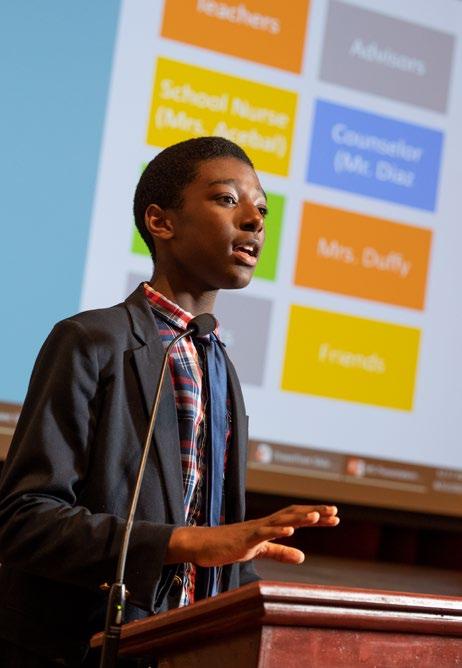
In fulfillment of Landon’s Character Pledge, members of the Landon community are committed to living by the high standards of Landon’s Honor Code, Civility Code, and Core Values.
For many years, Landon has emphasized character education and embraced both an Honor Code and a Civility Code. Honesty drives our Honor Code. Respect drives our Civility Code. More recently, Landon’s prior character education programming has evolved into its current Ethics, Service, & Leadership Program (the “Program”). The Program’s Mission is to help Landon boys become Ethical Servant Leaders who exemplify Landon’s Core Values of honesty, respect, inclusivity, responsibility, perseverance, teamwork, kindness, humility, courage, gratitude, and service. Landon continues to refine its comprehensive grades 3-12 scope and sequence for our ethics, service, & leadership curriculum that is overseen by our Director and implemented by Coordinators in each of Landon’s three Divisions (Upper, Middle, & Lower Schools).
44 i nde P endent s enior Project
HONORS AND ADVANCED COURSES
Advanced courses are college-level courses offered primarily in Forms V and VI. Students are carefully selected for Advanced courses according to the following criteria:
• teacher recommendation;
• grades in prerequisite courses;
• consideration of the student’s total academic load;
• other specific departmental requirements (see appropriate section).
Honors courses are significantly more rigorous than regular courses, and student work is expected to show greater depth, more sophisticated
reasoning, academic independence, and higher creativity. Upper-level Honors courses approach Advanced courses in their degrees of expectation and difficulty. Students need specific departmental recommendations to take Honors courses.
Students may not take a combination of more than three Advanced/Honors courses in a given year without permission of the head of the Upper School. The work of a typical Advanced course involves homework of an hour or more each night. Landon expects its students to give serious commitment to Advanced courses.
GENERAL NOTES
• In the Upper School, a unit of credit is awarded by successfully completing a course that meets for 325 minutes of class work per ten-day cycle throughout the school year of at least 170 days. Credit is not awarded if the course is not completed as presented in its course description.
• All students must fulfill three athletics requirements (team participation, strength, intramural activity, etc.) per academic year.
• All students in Form III must complete courses in Character Education, Diversity, Life Skills, Study Skills.
• To receive credit for a course, a student must earn a passing grade of 60 or better
• Students earning a cumulative grade below 70 in English, Mathematics, or a World Language will be required to complete summer work before enrolling in the subsequent course.
45 a d V anced Placement and h onors c ourses / General n otes
IMPORTANT NOTES ABOUT SCHEDULE CHANGES
Purpose of the Curriculum
The major purposes of Landon’s curriculum are to challenge its boys to perform at the highest level of their abilities, to cultivate the virtue of perseverance, and to prepare them for meaningful collegiate and post-collegiate life though the development of skills, knowledge, and habits of mind. Great care is thus taken in placing the boys into courses appropriate to their present levels of capability.
Careful Choices
As students move through the Upper School, their responsibilities – both curricular and co-curricular – often become more burdensome. The Form V and VI years in particular are marked by academic challenges such as Advanced courses, the required Humanities class, and the increased time commitment of college application process; in addition, boys may simultaneously find themselves giving more time to increased roles in the school’s athletics, community service, and performing arts programs. Course selections, then, must be made with careful consideration of the boy’s overall experience and time commitments. With the guidance of the advisor, families and boys should compile an academic schedule that recognizes the various demands on the time of talented, engaged boys. While Landon does not mandate that boys challenge themselves with certain courses, it does call for boys to honor the schedule that they freely select.
Drop/Add Period
Procedures are in place to change a course, if the student and his family believe that he has been misplaced, or if his academic interests have evolved. Students must recognize, however, that even minor changes may be difficult to accomplish once the master class schedule is set. Available space in a course, the flexibility of a student’s schedule, and specific course requirements are just a few of the factors considered in approving a drop/add request. Such drop/add requests should be submitted by the end of the add/drop period (first two weeks of the first semester, first week of the second semester), but – again – submission is not a guarantor of change.
Teacher Recommendation
At any point in the year, a teacher may recognize, through the student’s performance on assessments and in class, that a boy has been improperly placed according to his present levels of capability. In such instances, the teacher, in consultation with the department chair, will suggest a schedule adjustment that better serves the student’s learning. It must be reiterated that the recommendation here comes from the teacher, based upon their observations, evaluations, and professional expertise.
Extraordinary Circumstances
Students wishing to change a schedule beyond the drop/ add period may petition the school for recognition of “extraordinary circumstances.” The petition would demonstrate that the student had exhausted all available opportunities for enhanced understanding (completion of required assignments, out-of-class meetings with his teacher, consultation with the Teaching and Learning Center, etc.), and was enduring undue emotional and/or temporal hardship in his efforts to work to the highest level of his ability. Other considerations –disappointment with a quarter grade, dissatisfaction with the level of effort legitimately demanded by the discipline, etc. – do not contribute to “extraordinary circumstances.” Petitions will be evaluated by a committee comprised of the student’s advisor, the student’s teacher, the appropriate department chair, the appropriate form advisor, and the head of the Upper School. While each case will be carefully considered, it must be understood that the definition of “extraordinary circumstances” is an extremely difficult one to meet, and that such instances are likely to be very rare indeed.
46 i m P ortant n otes a bout s chedule c han G es
6101 Wilson Lane, Bethesda, Maryland 20817 301.320.3200 | info@landon.net LANDON.NET A Private School for Boys Grades 3–12














